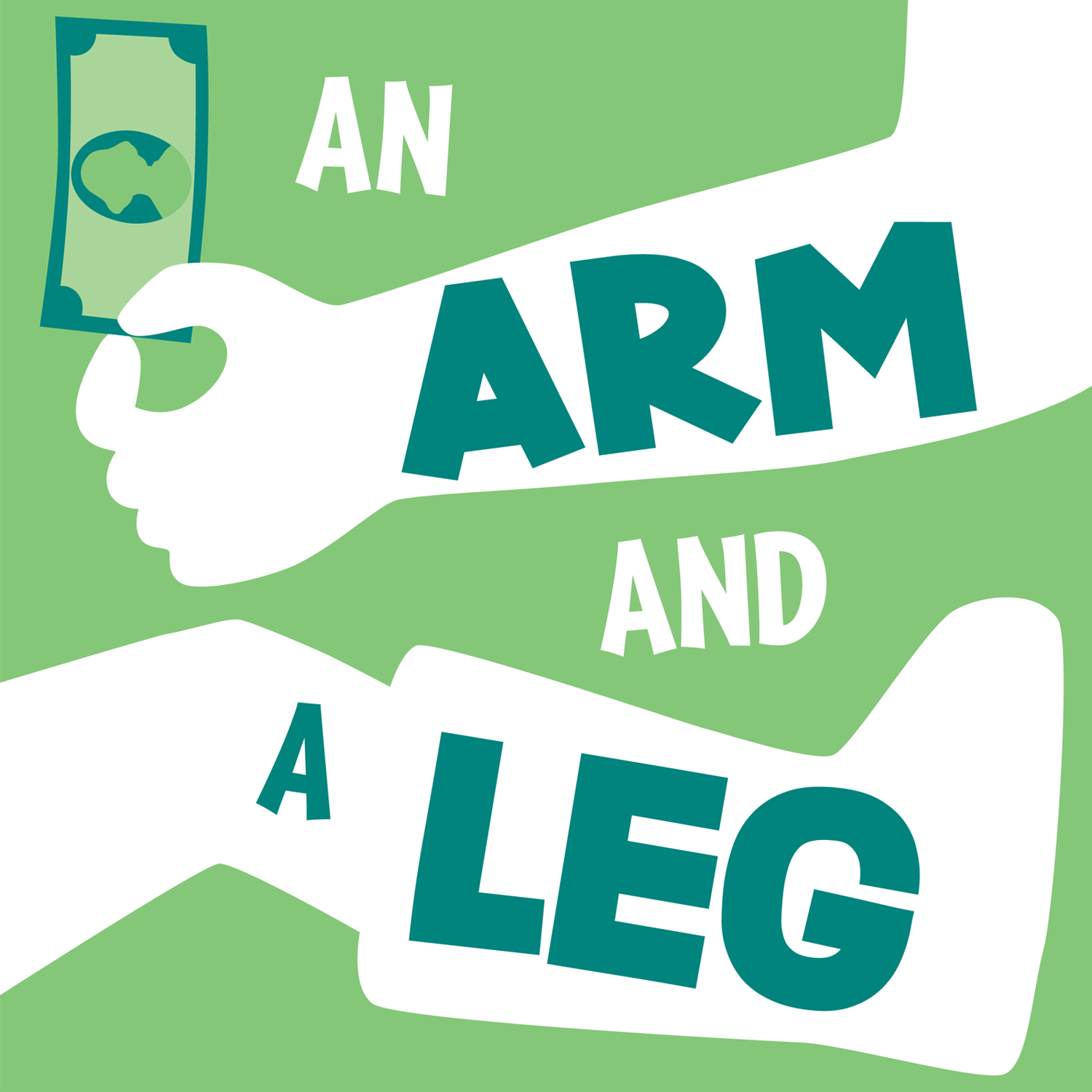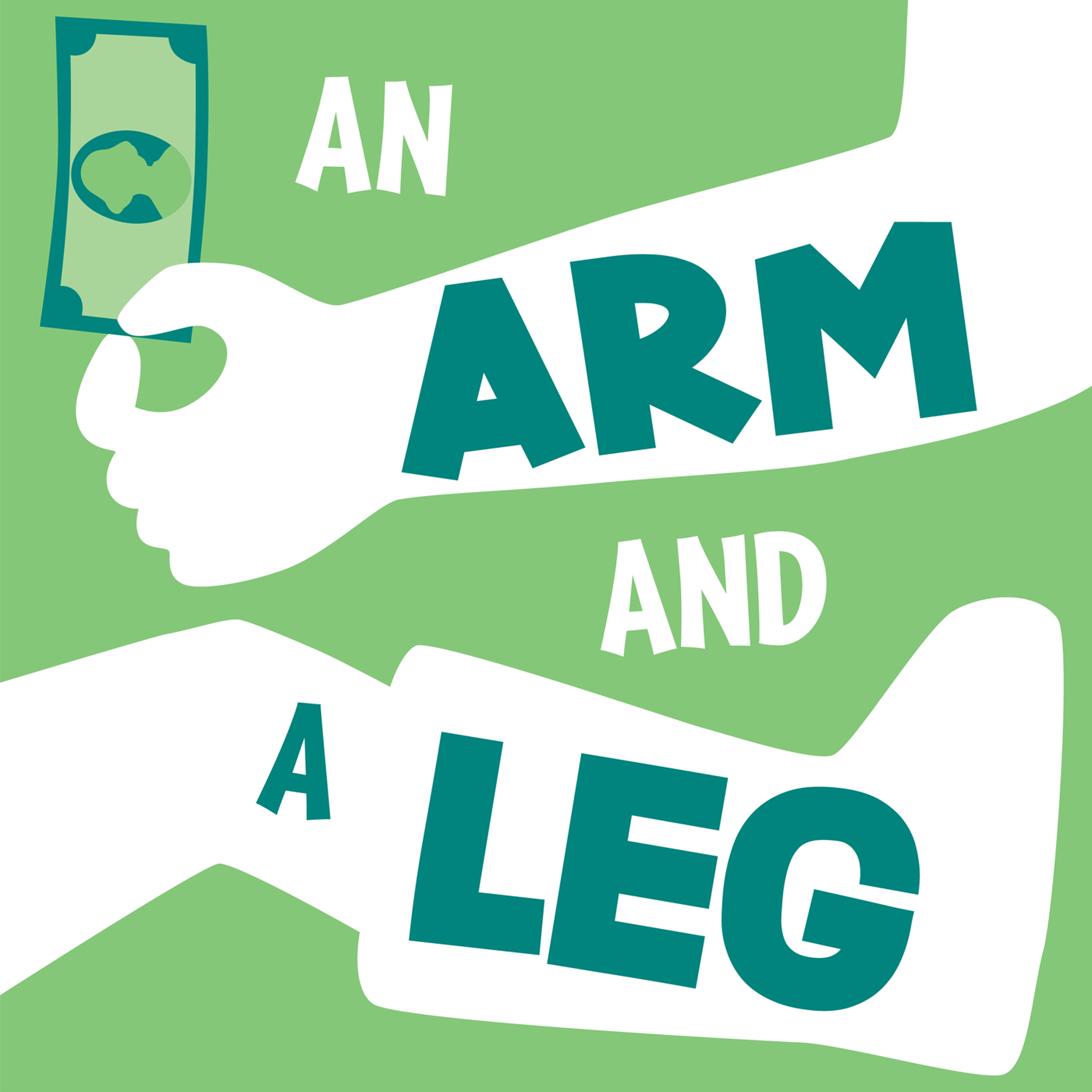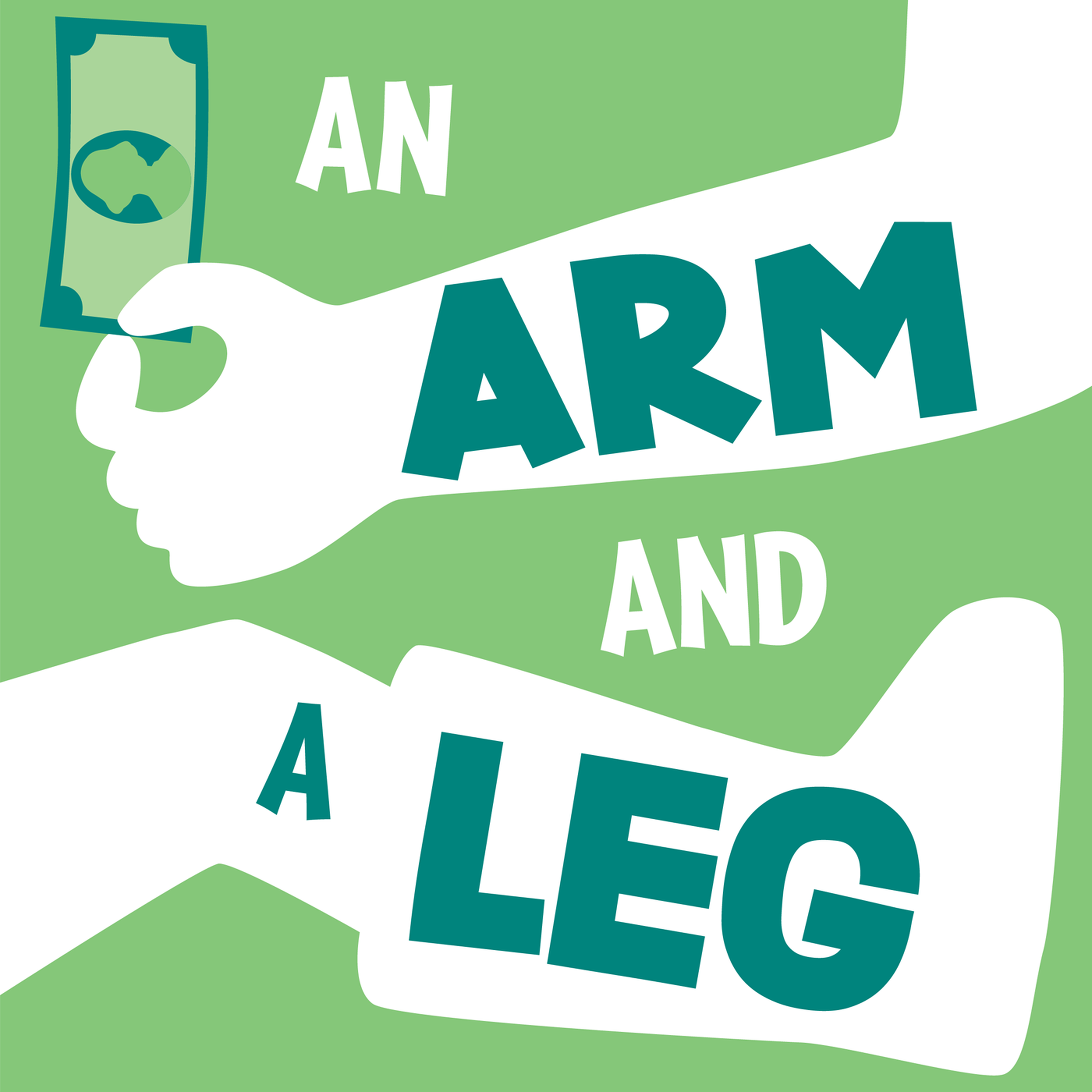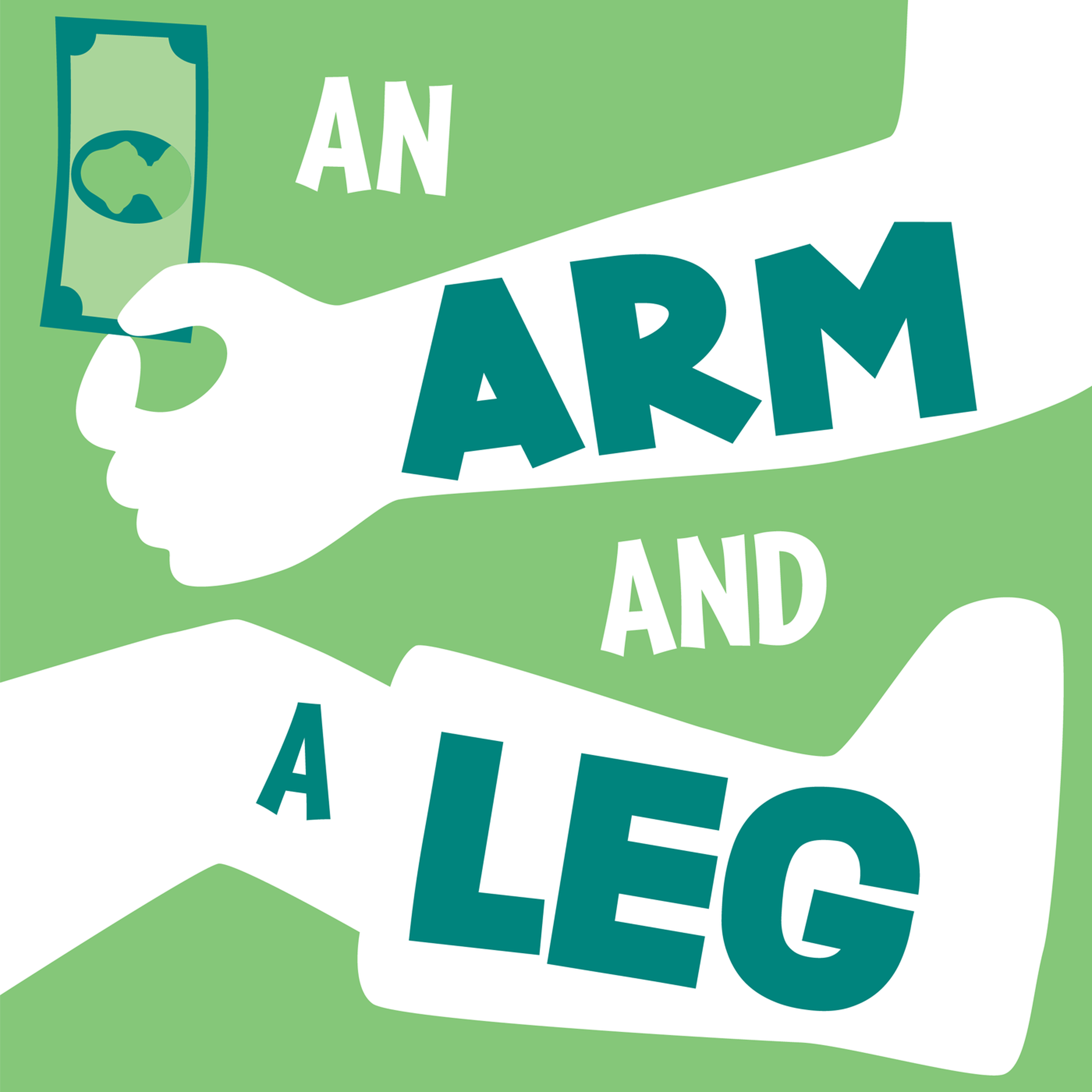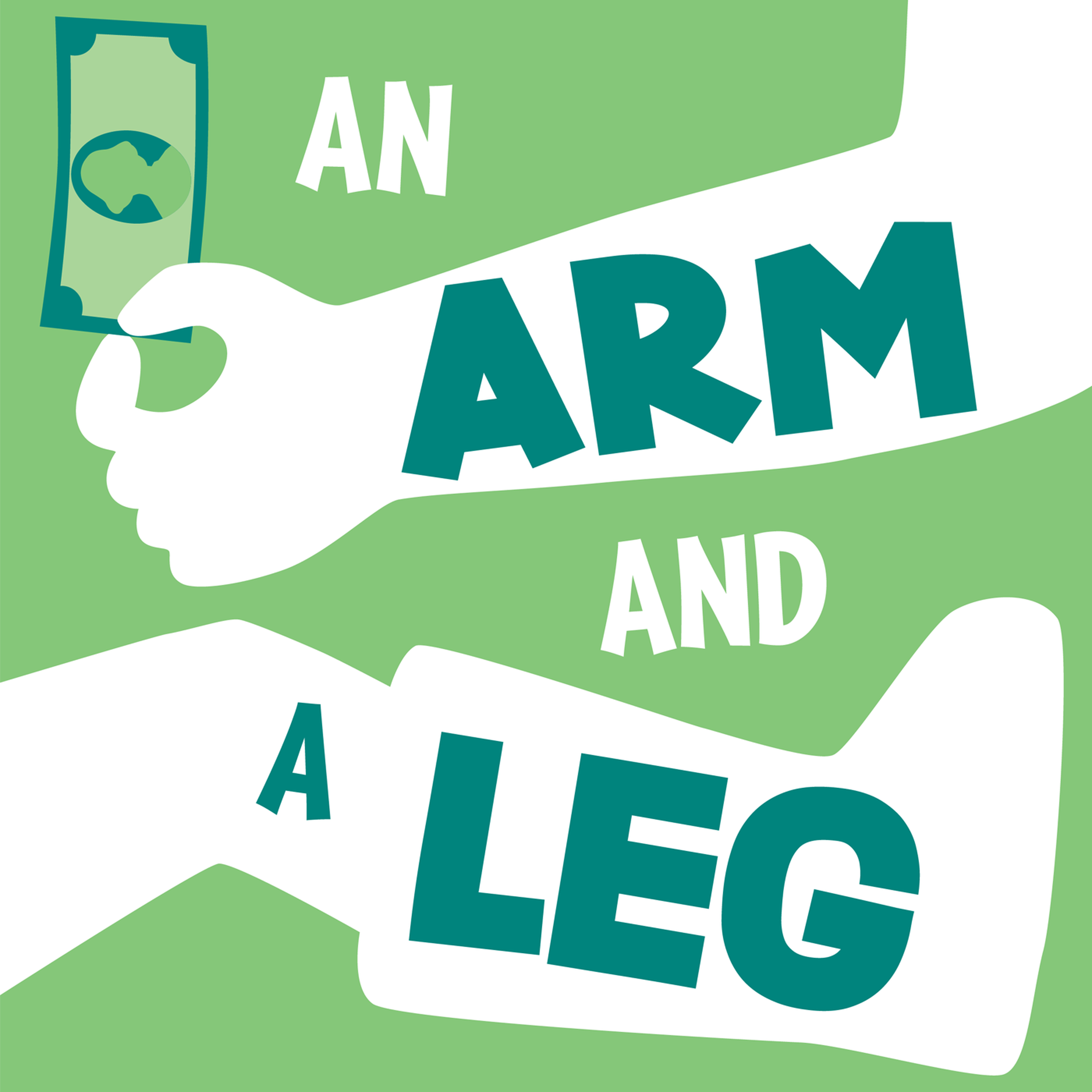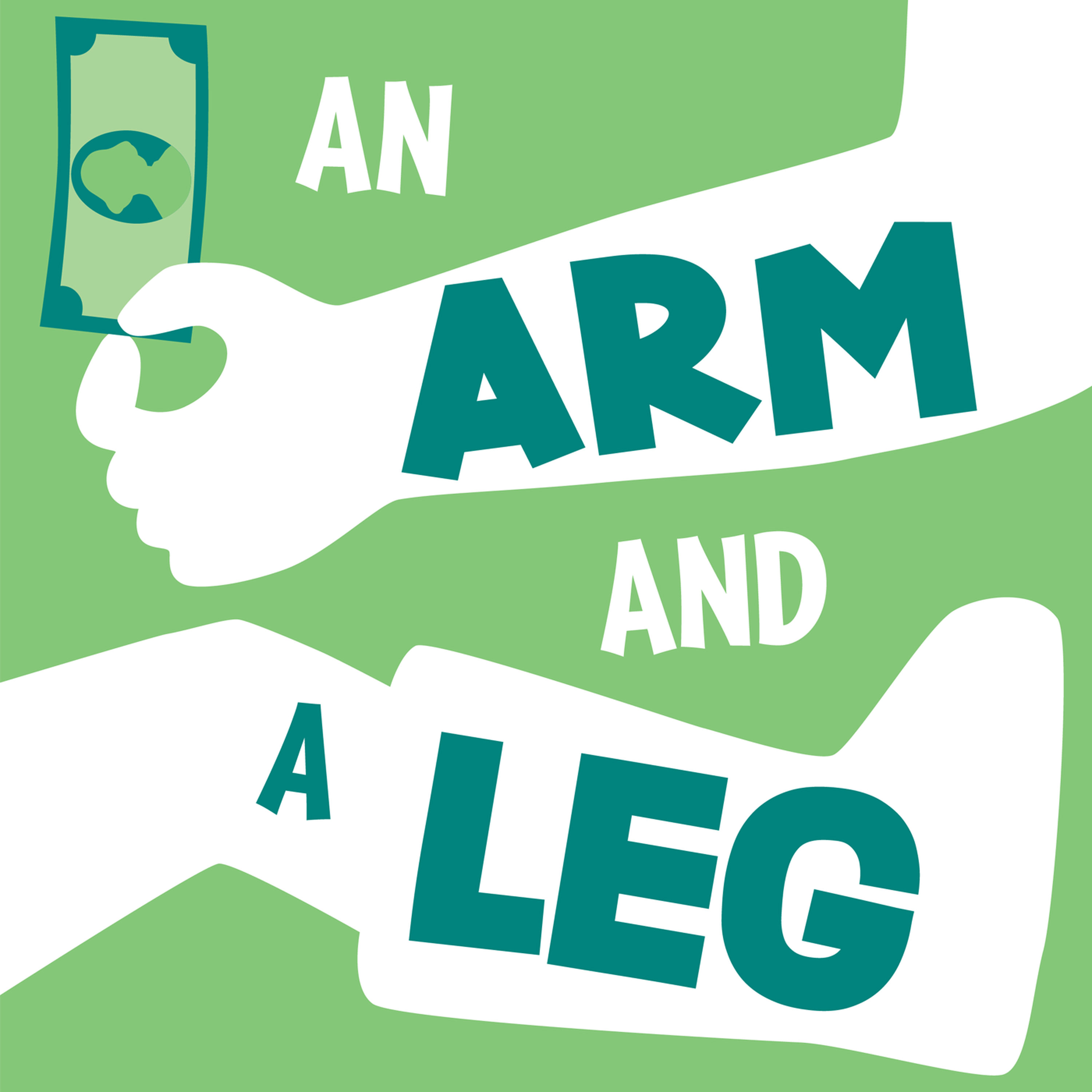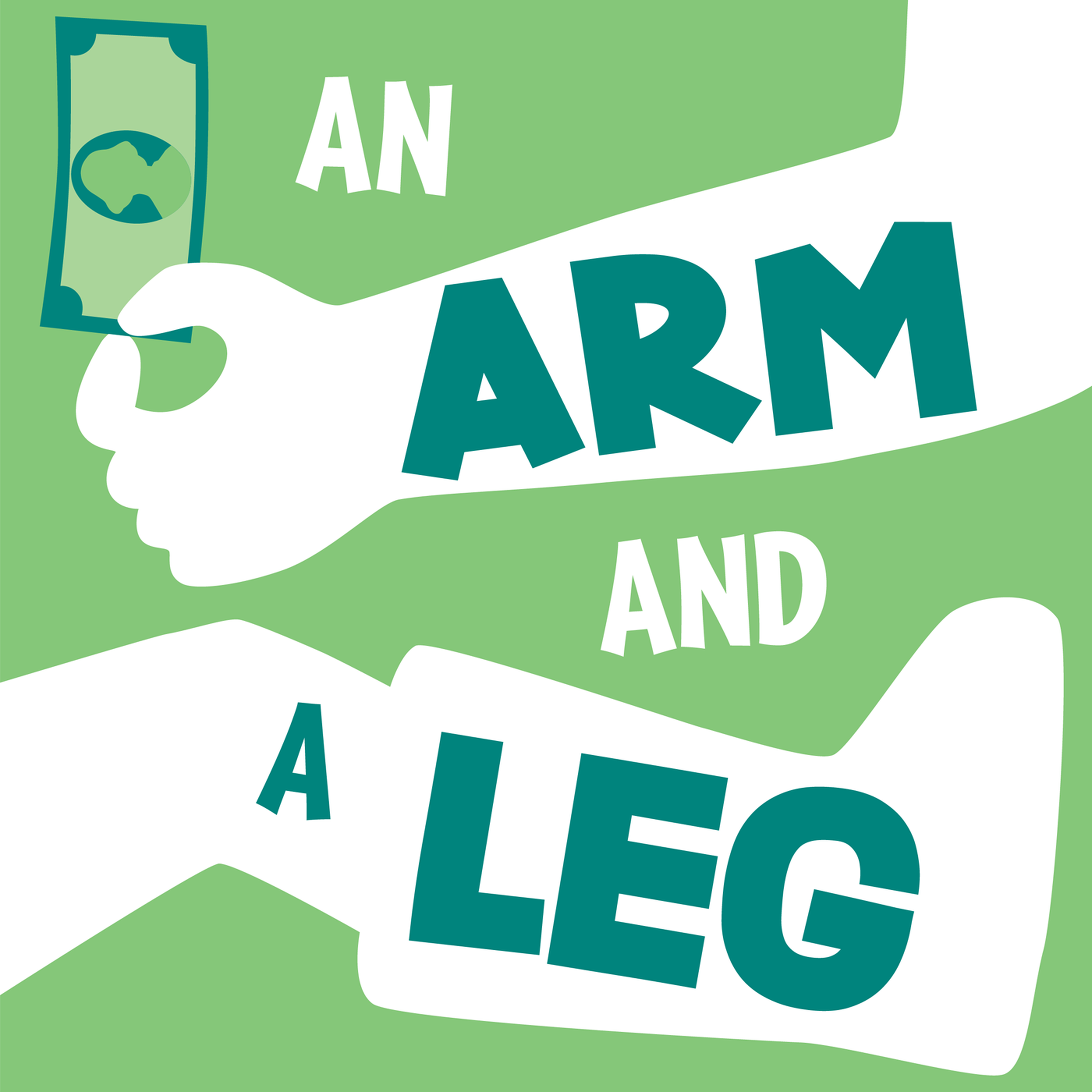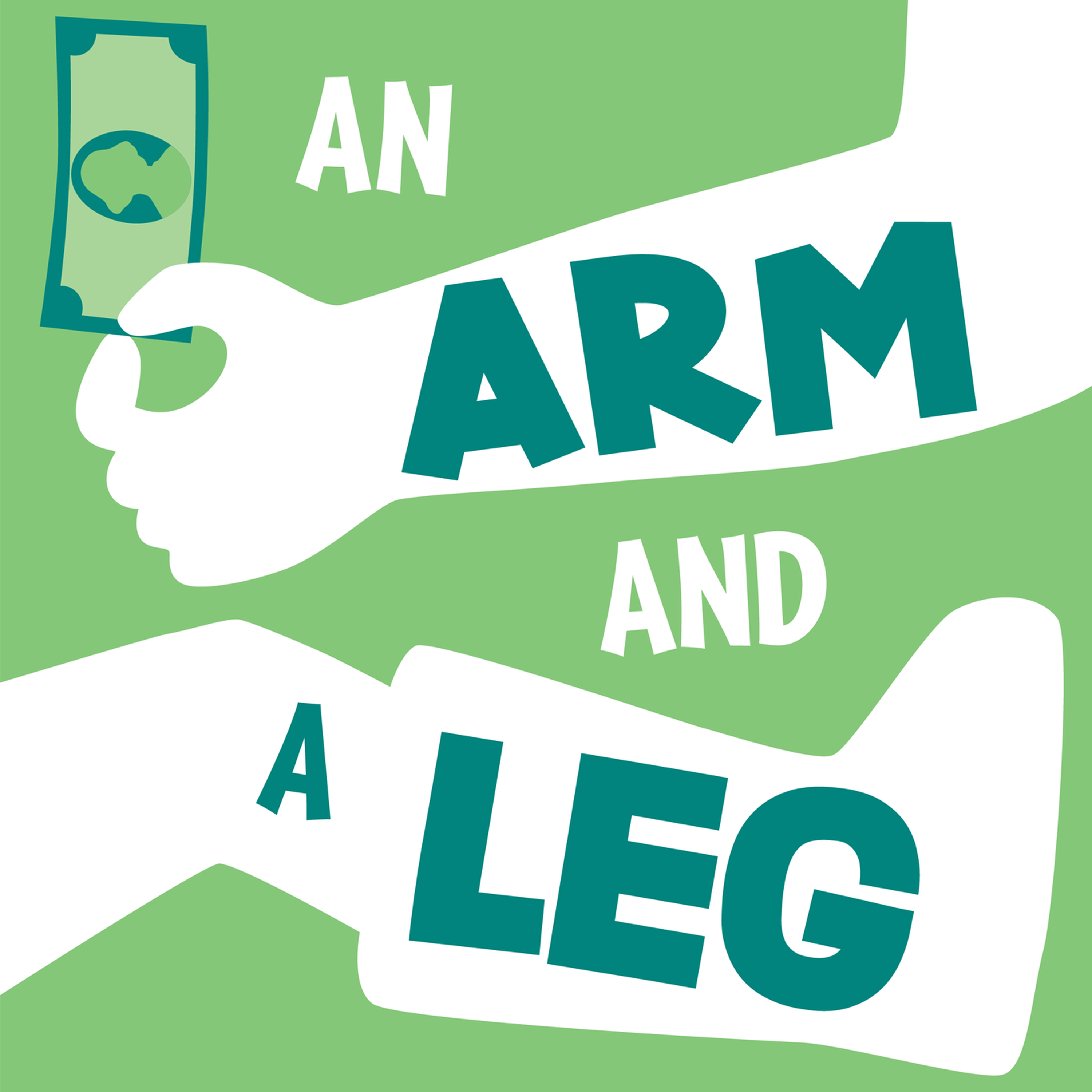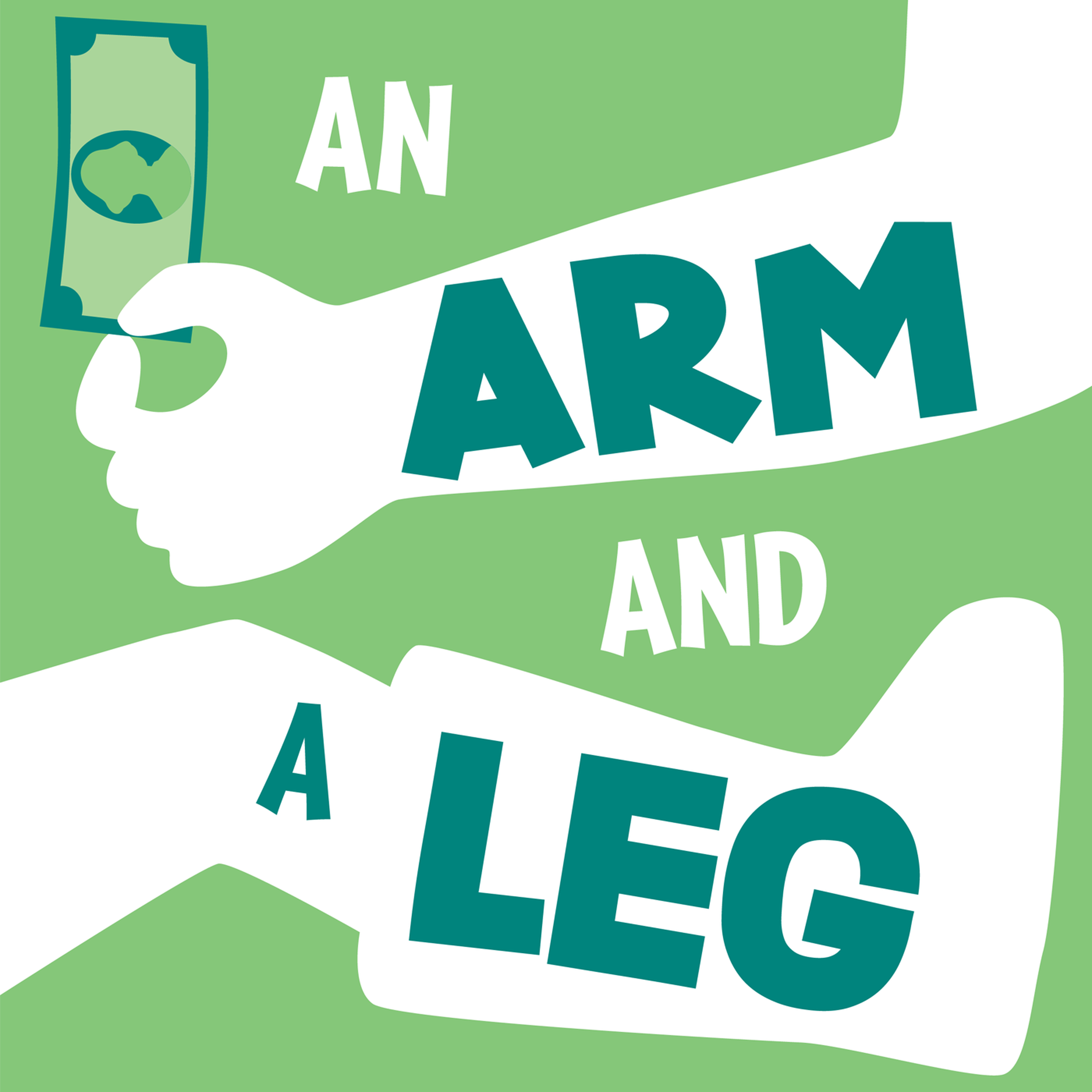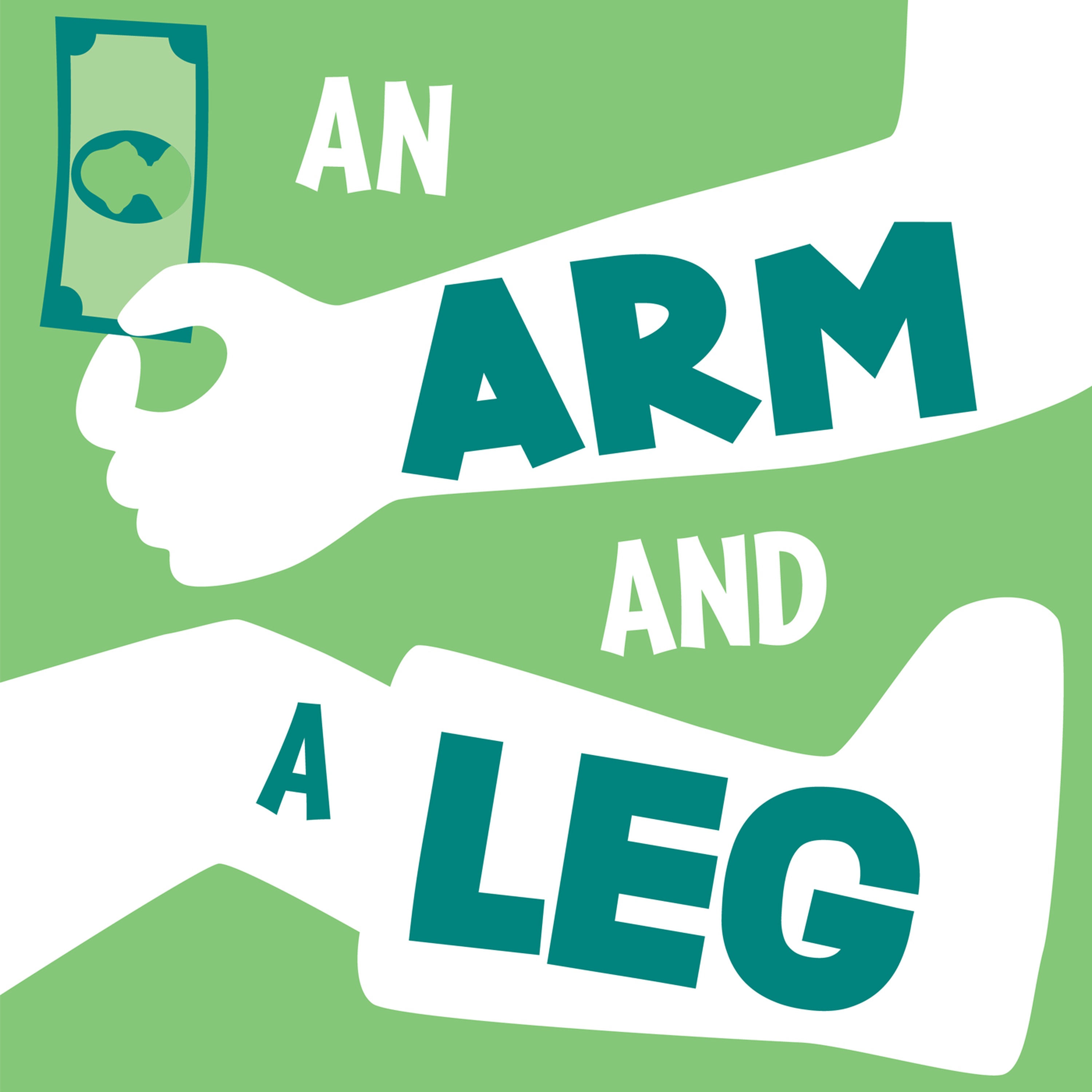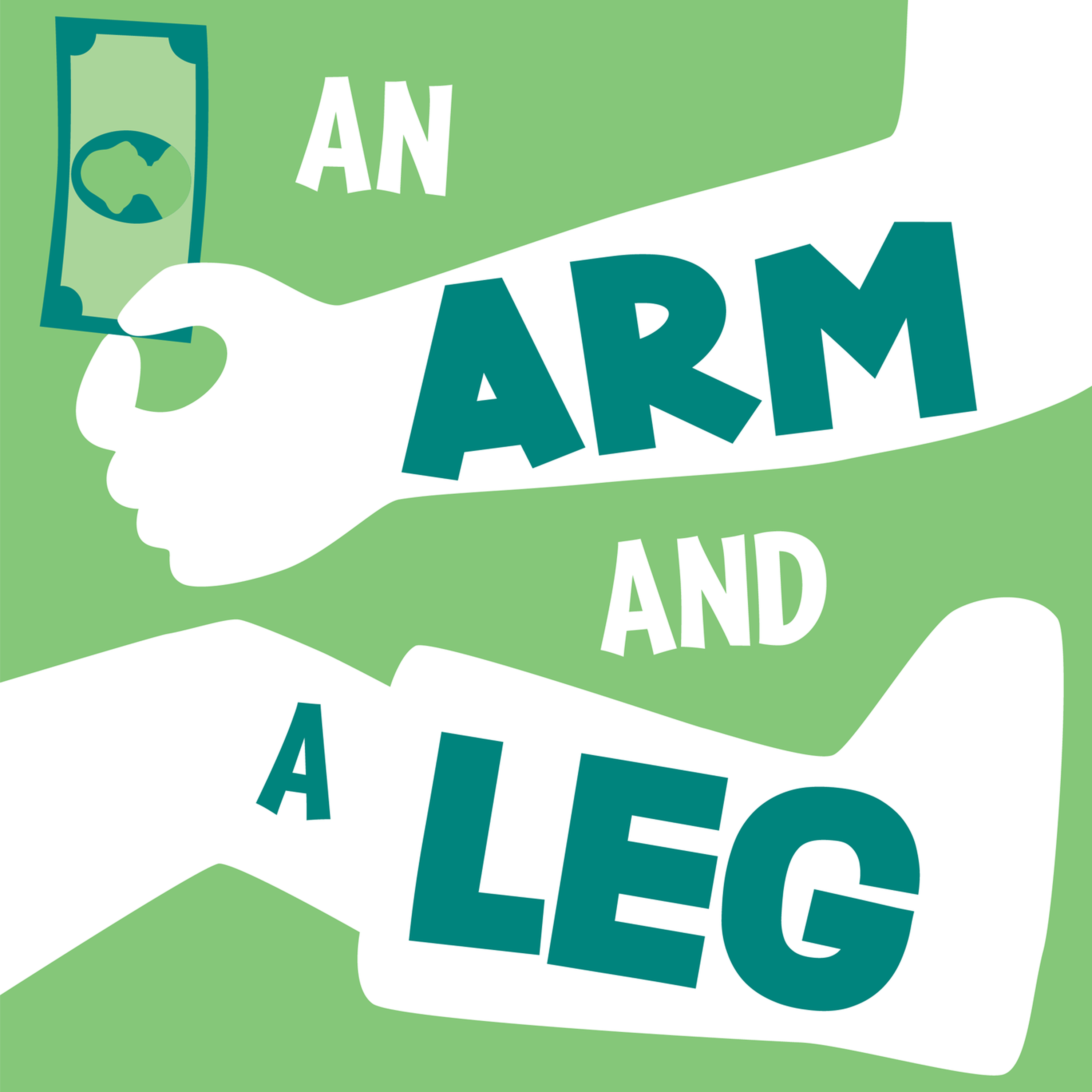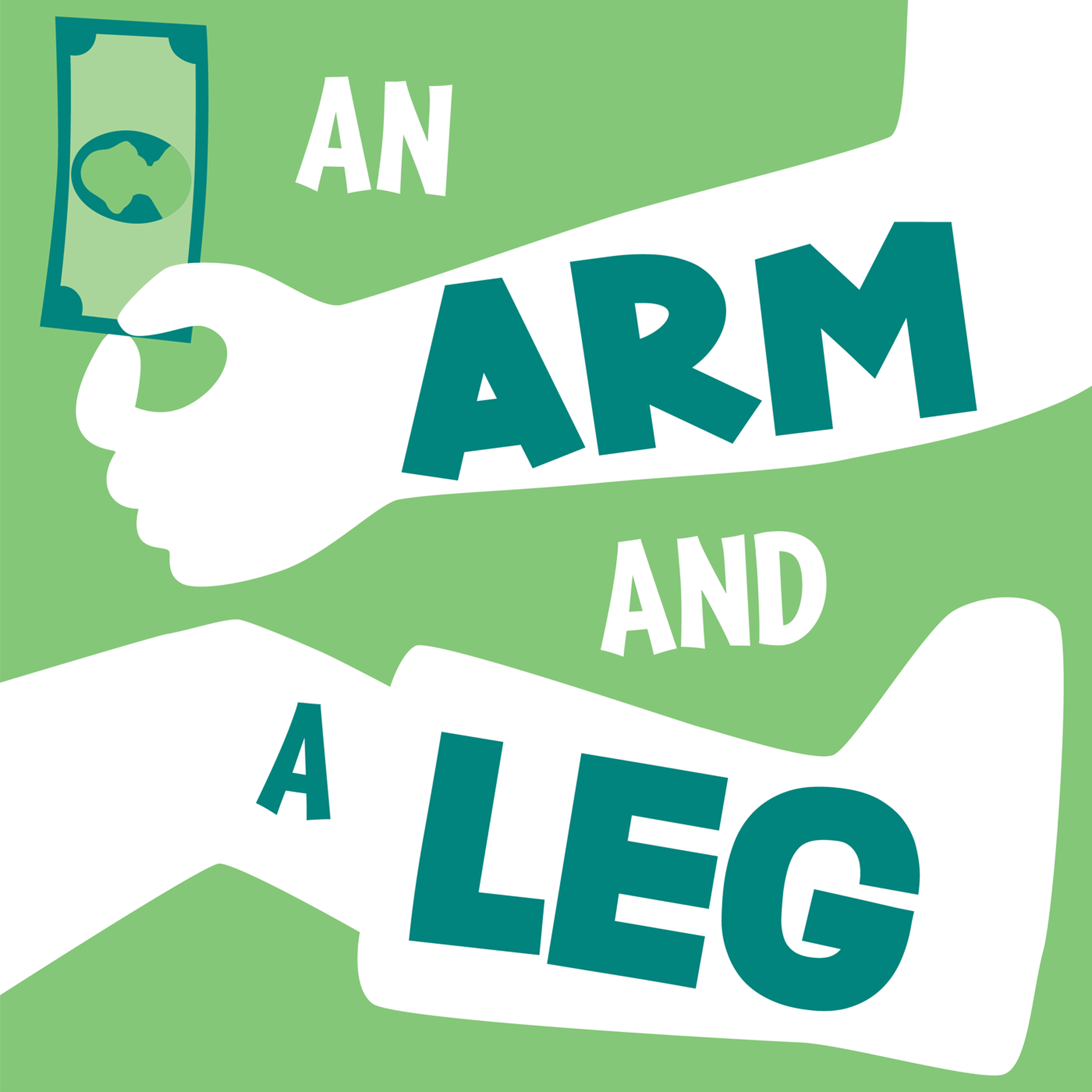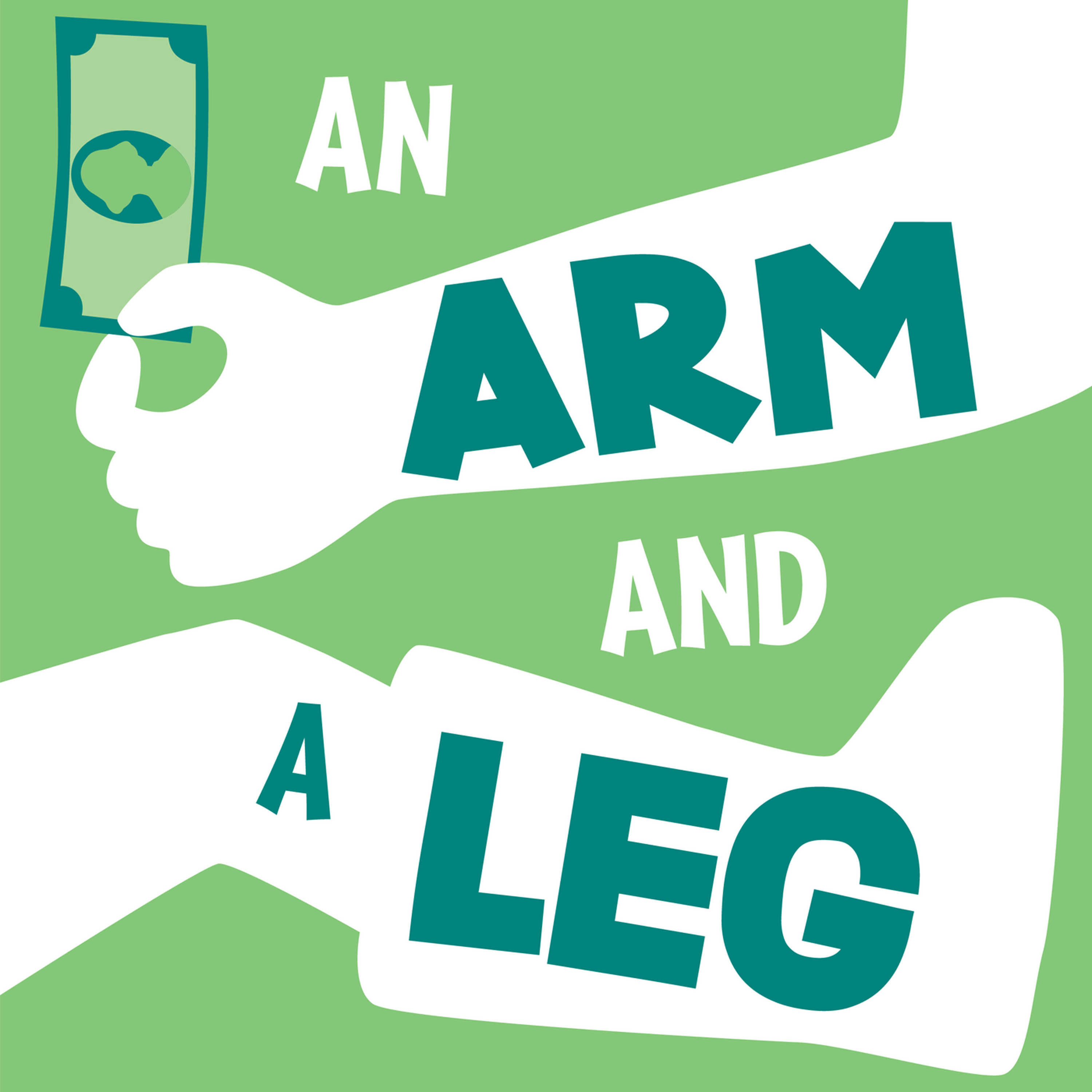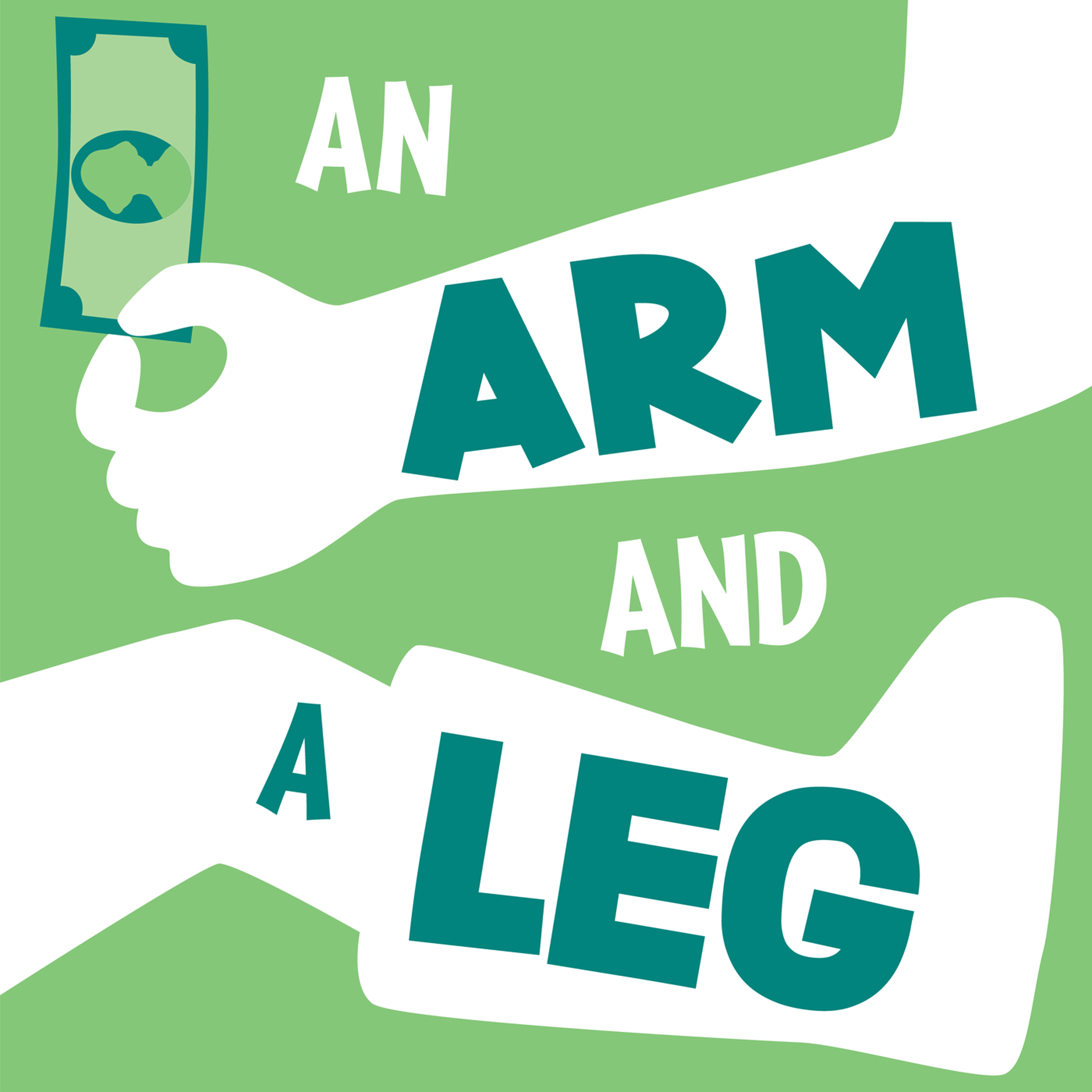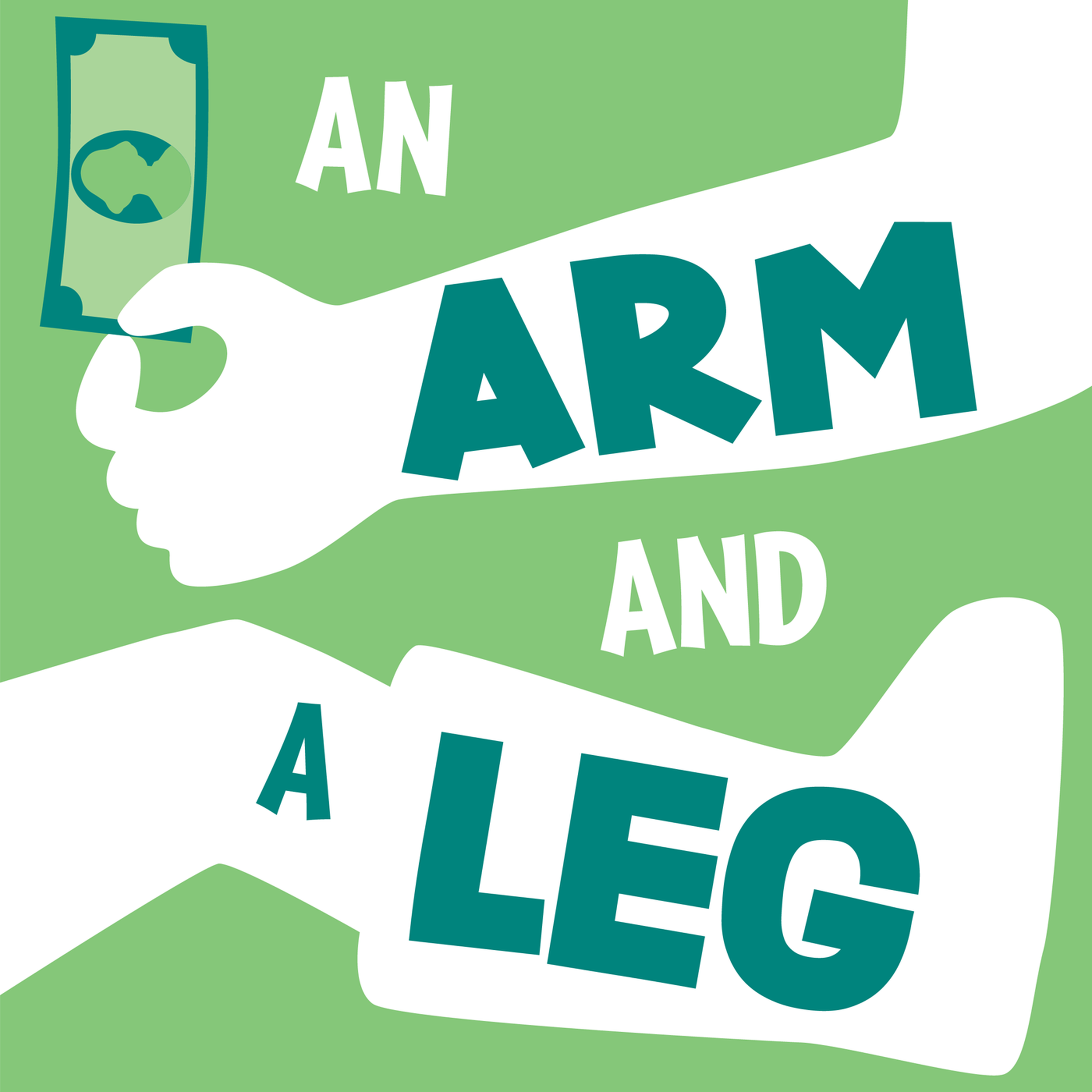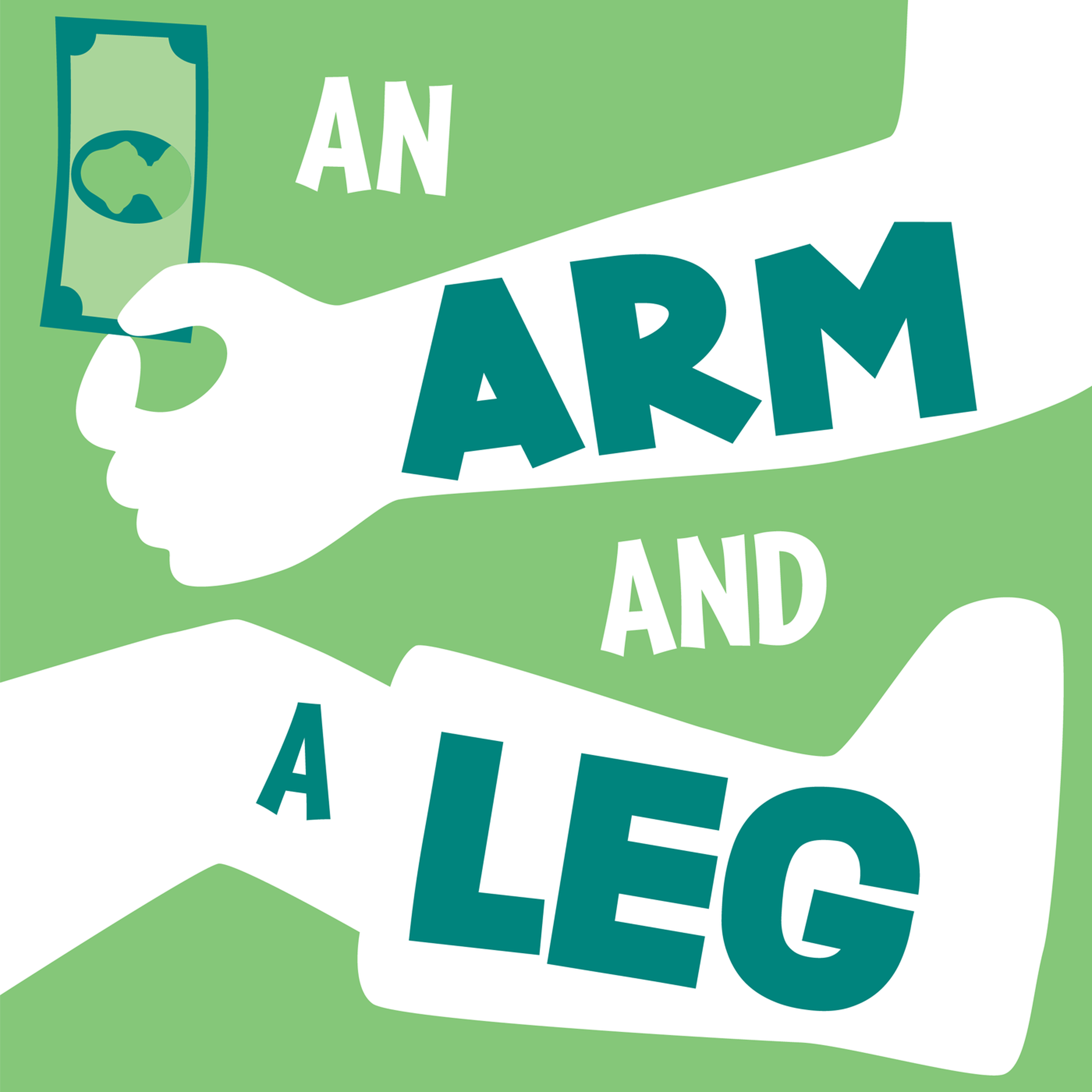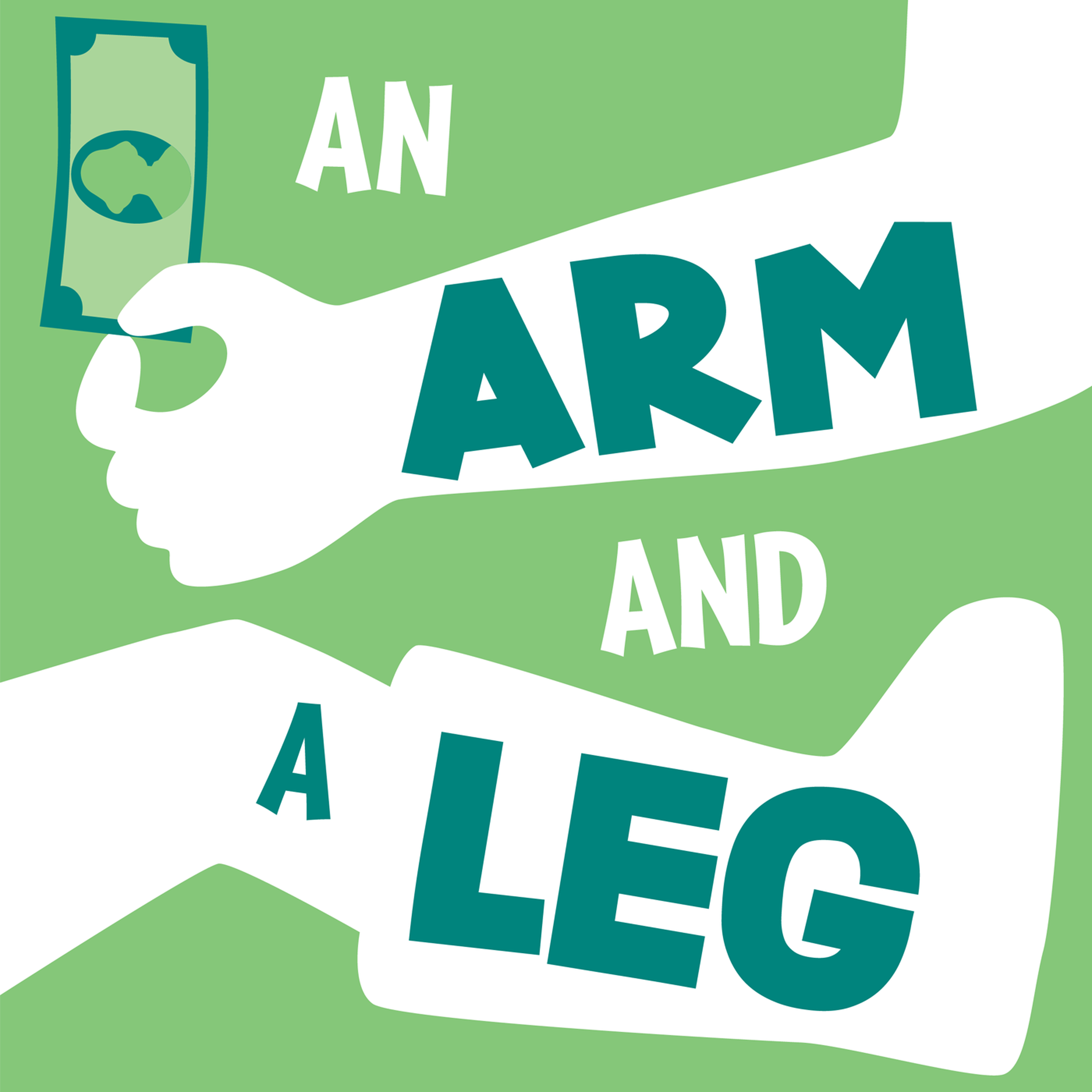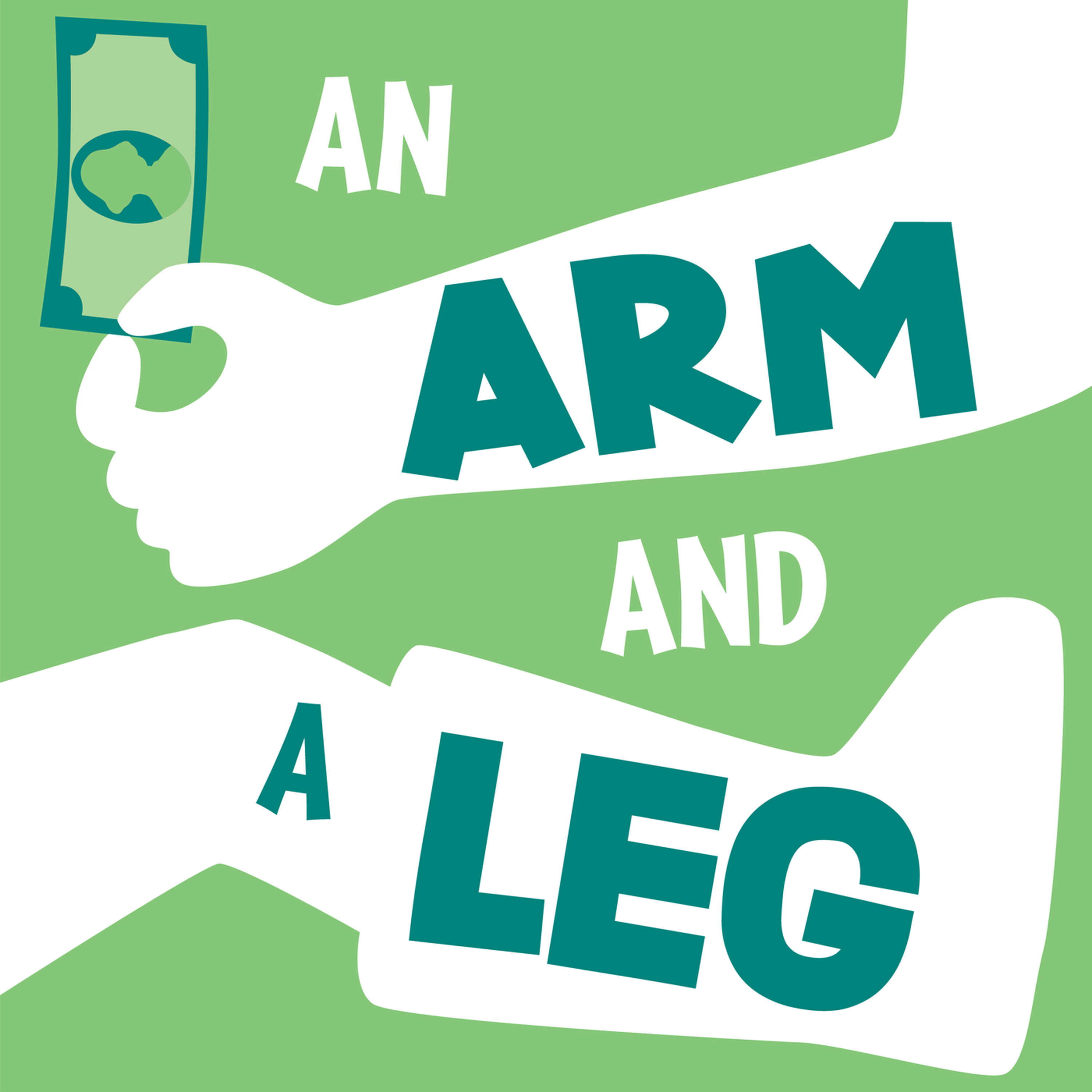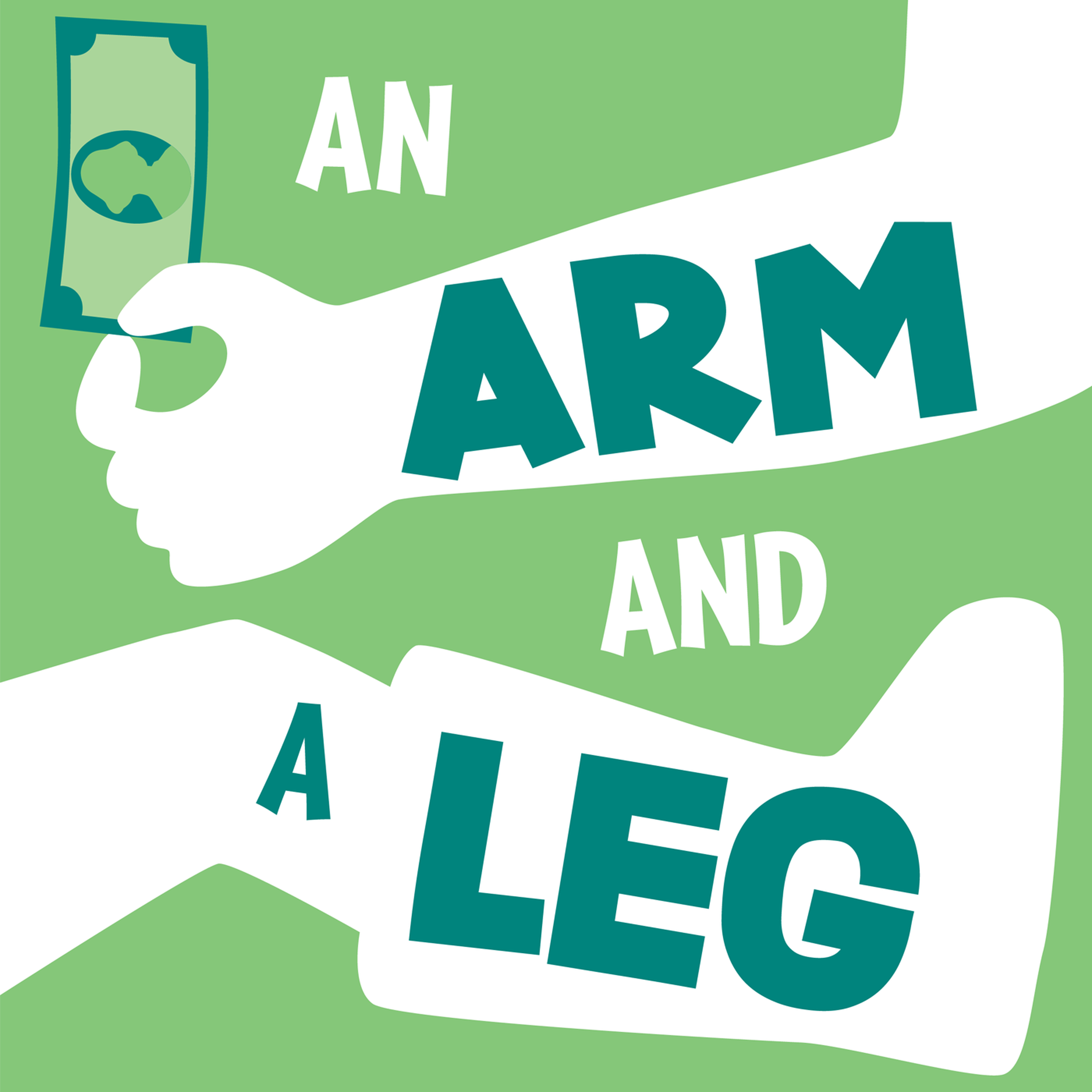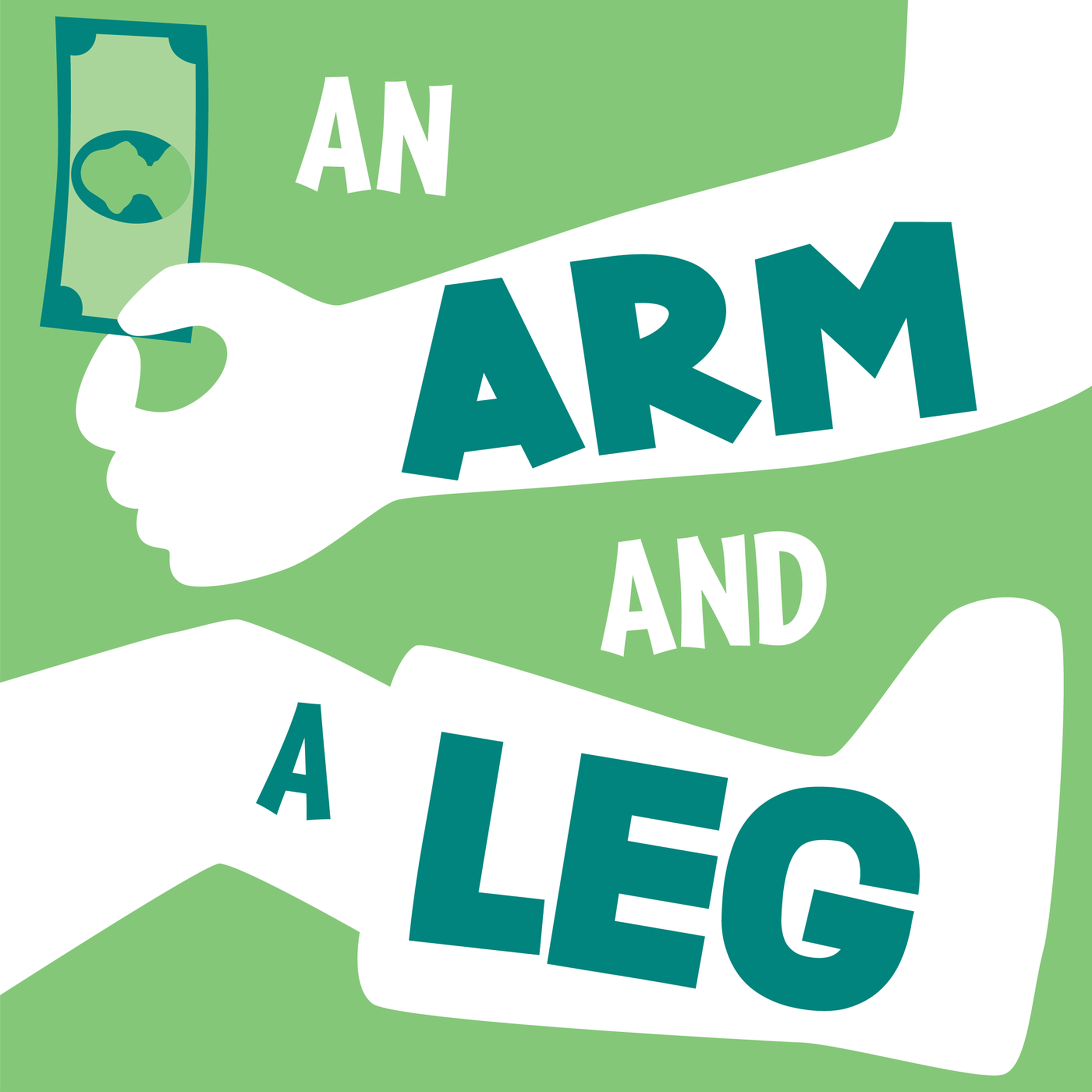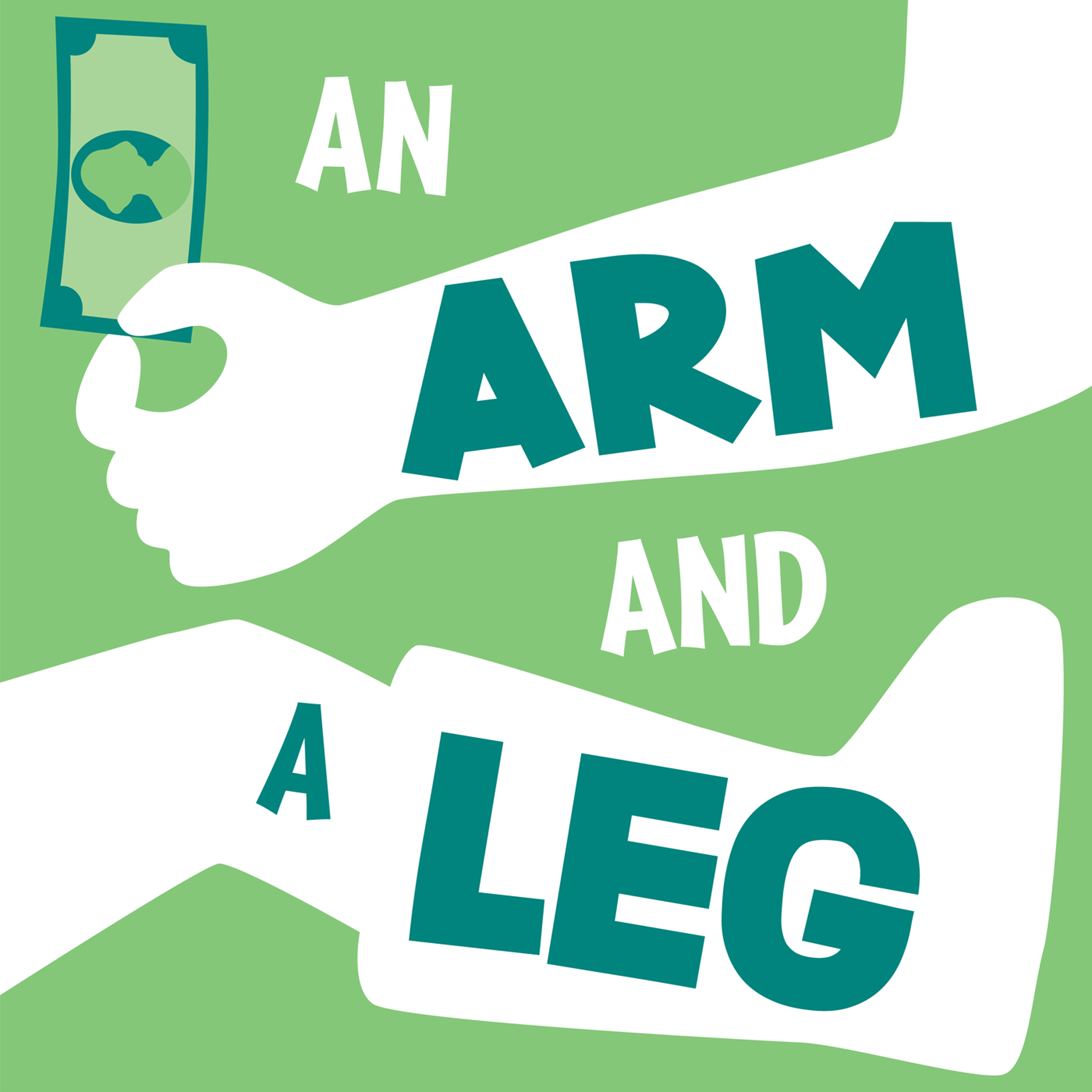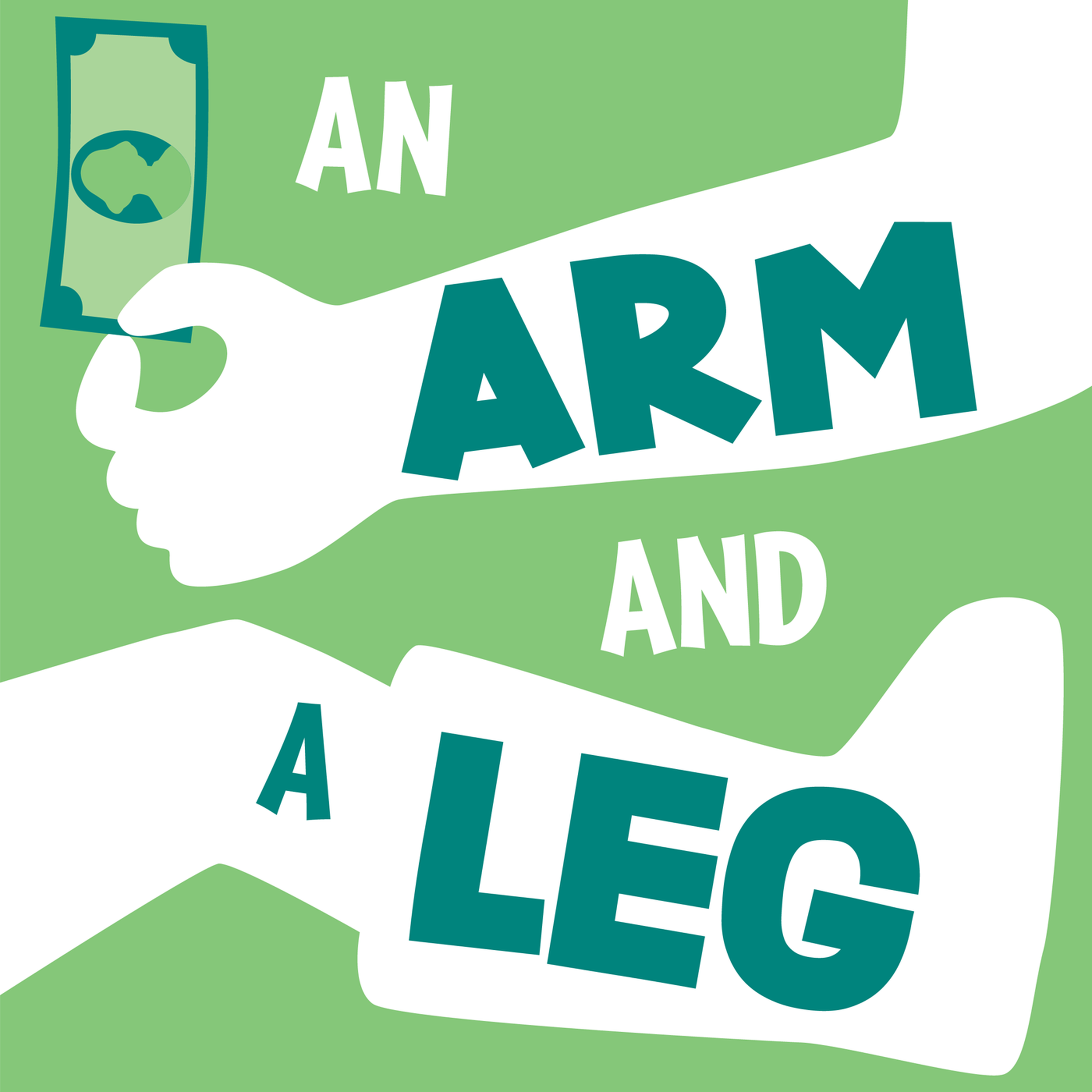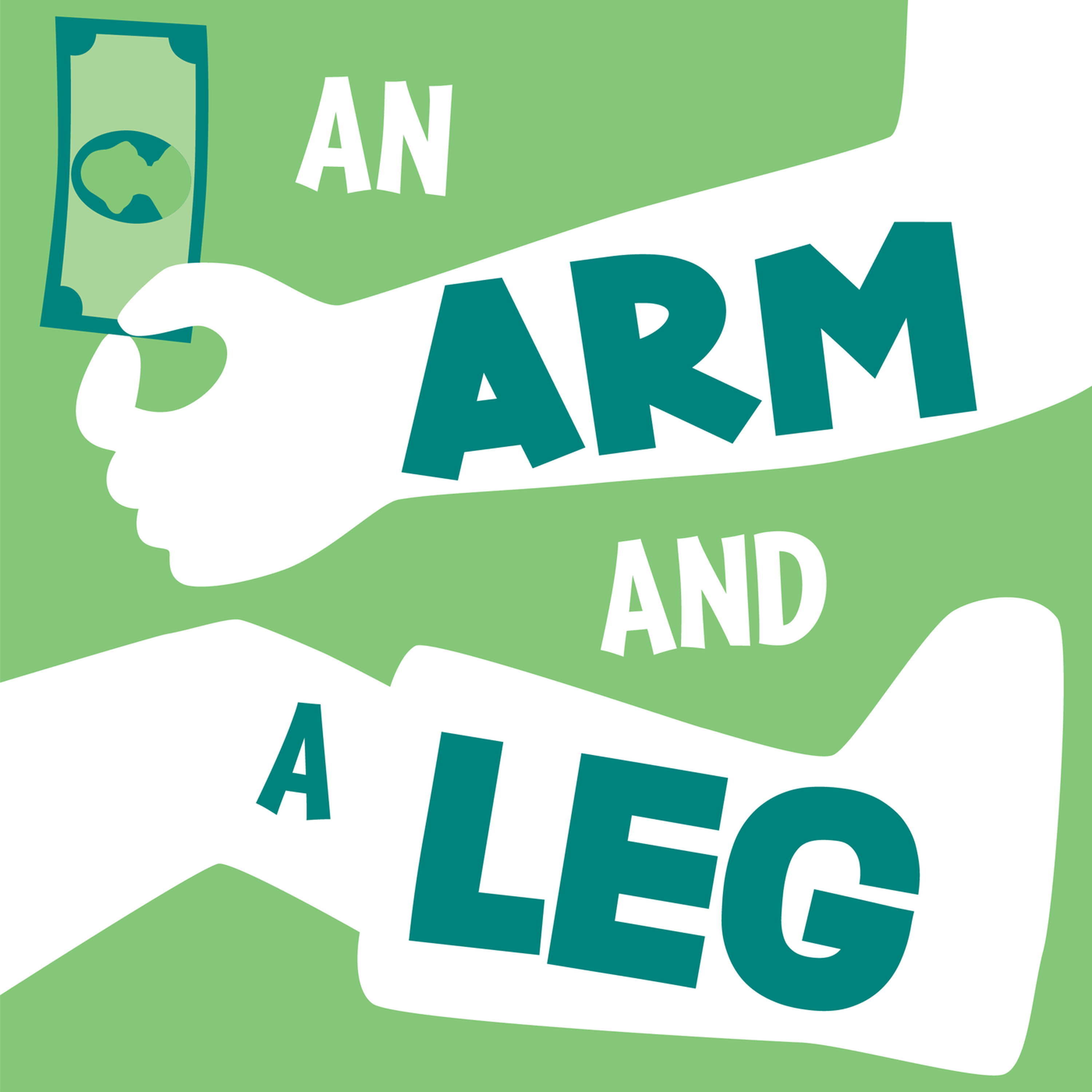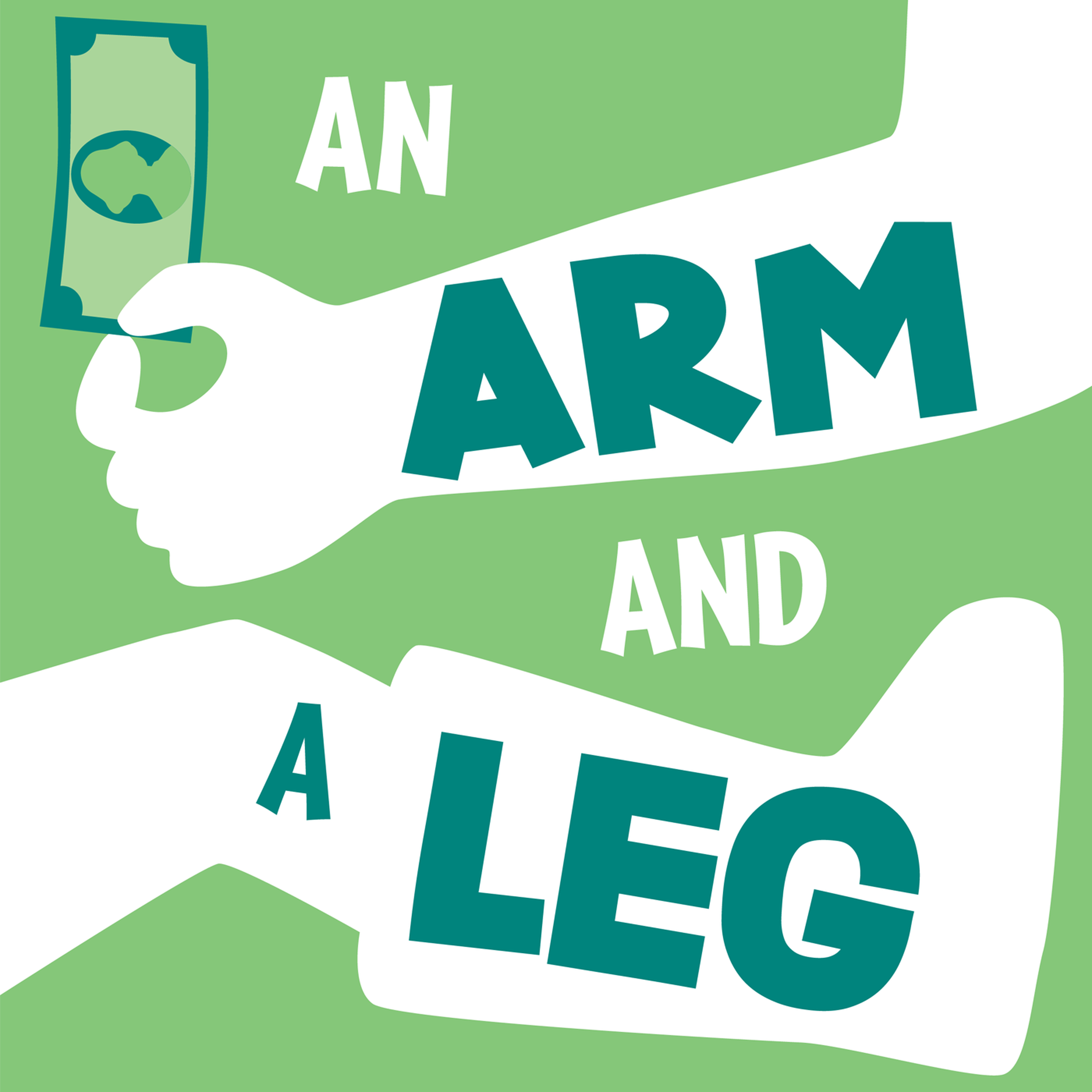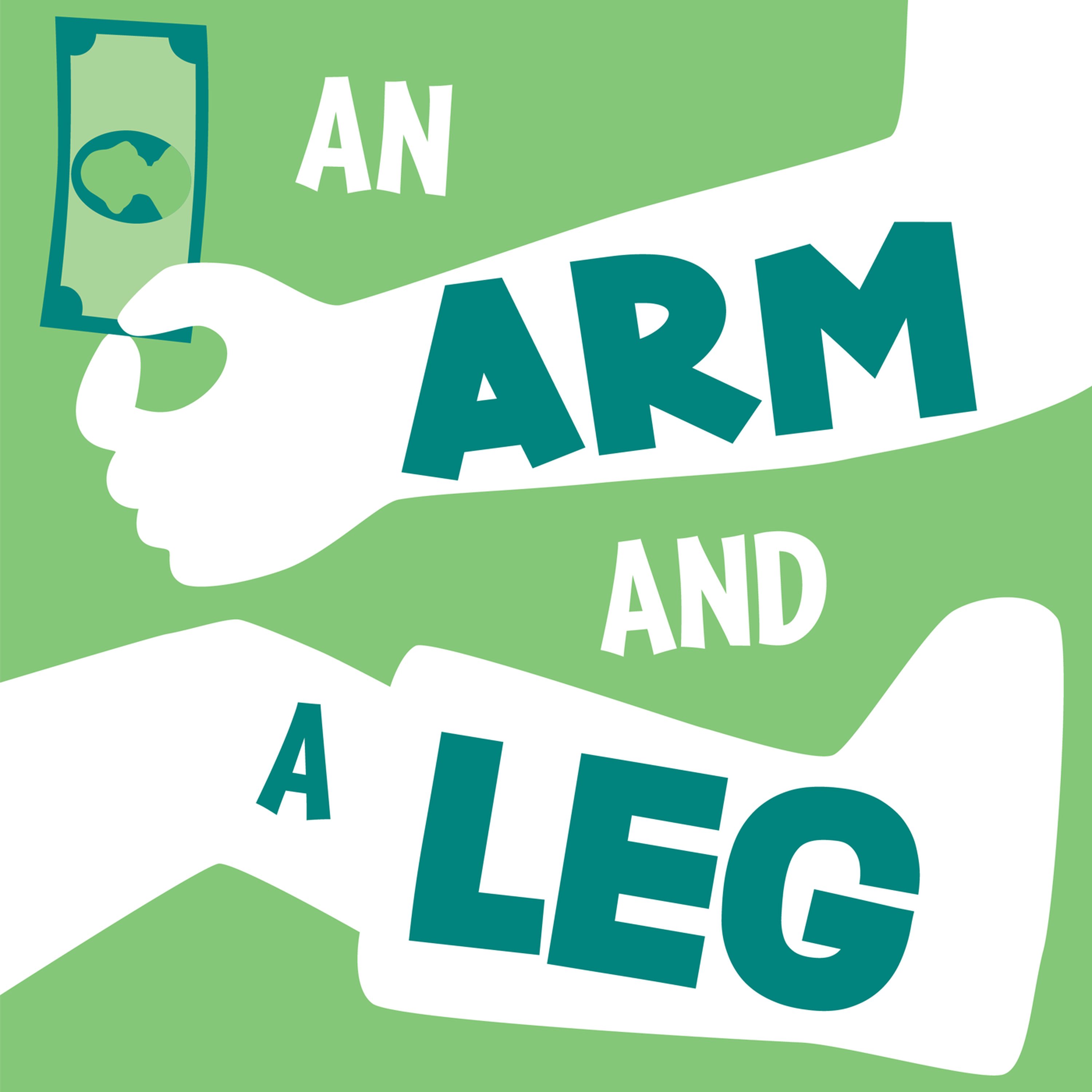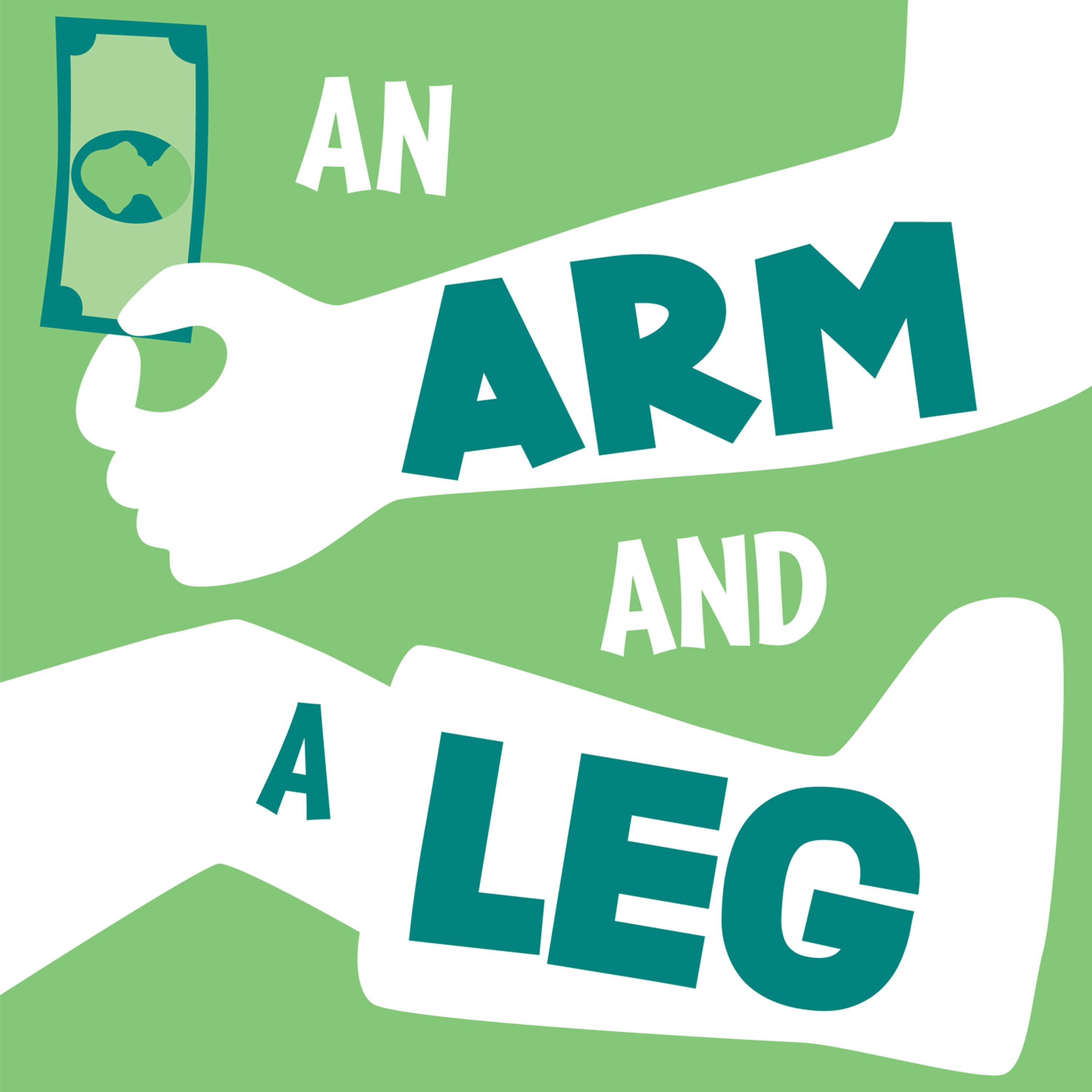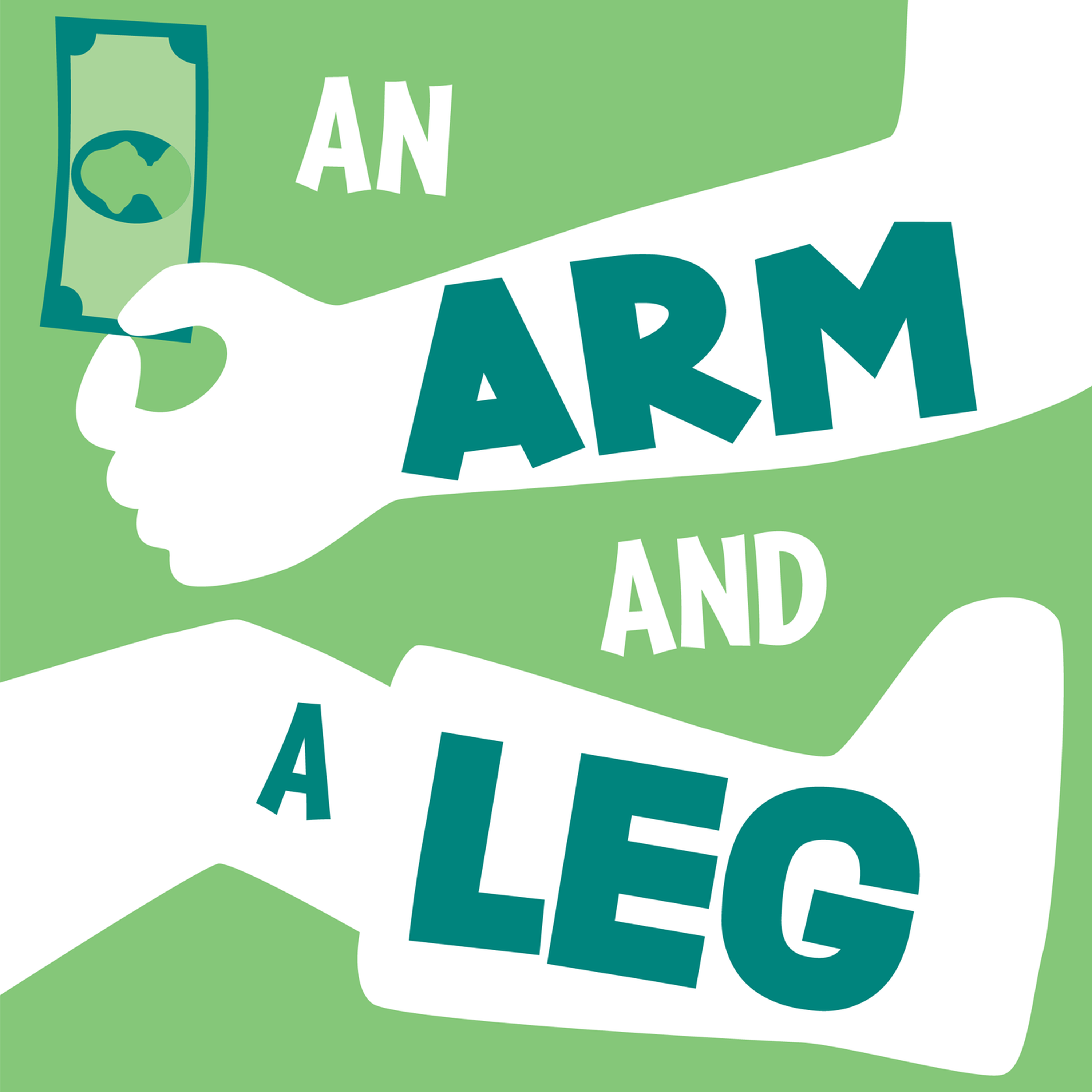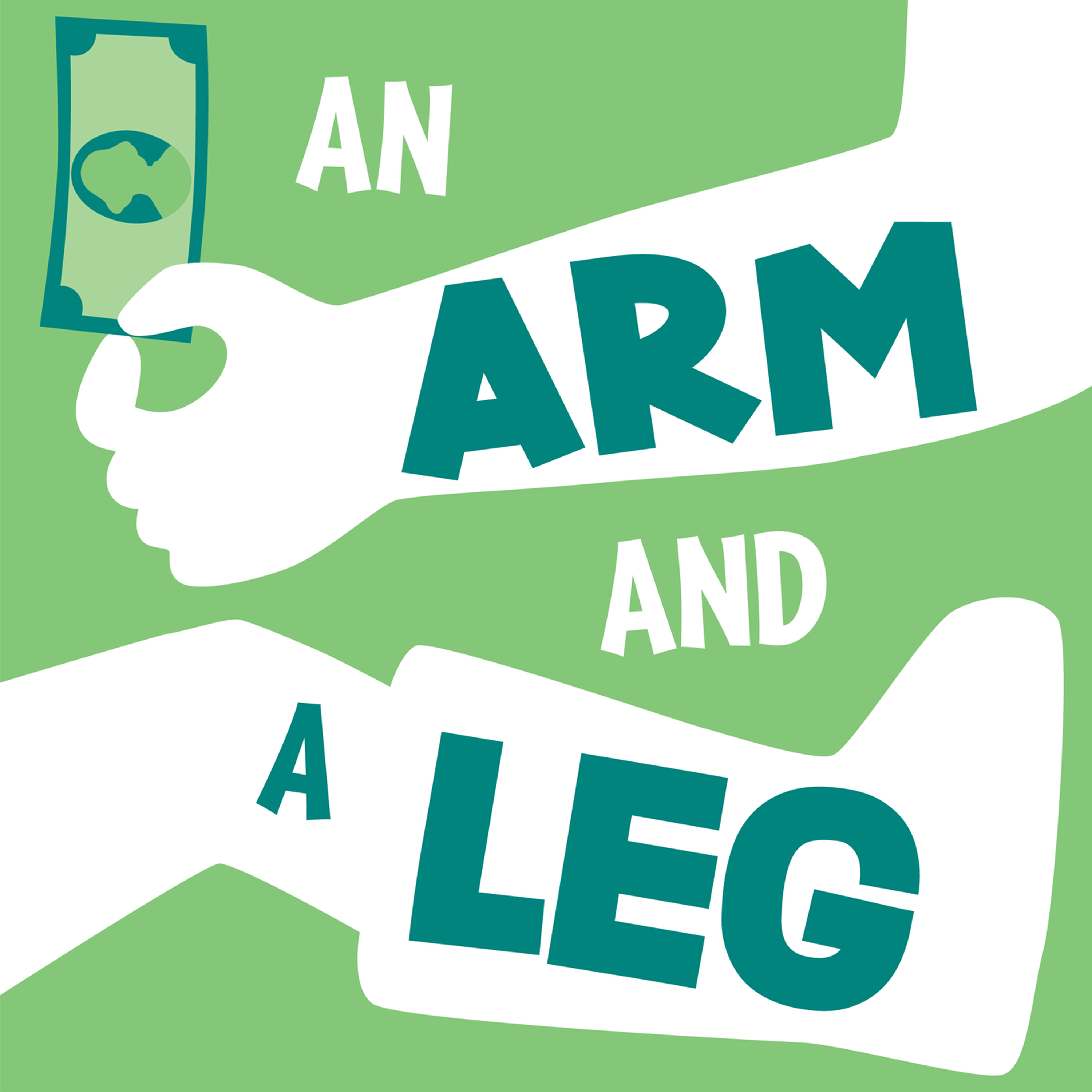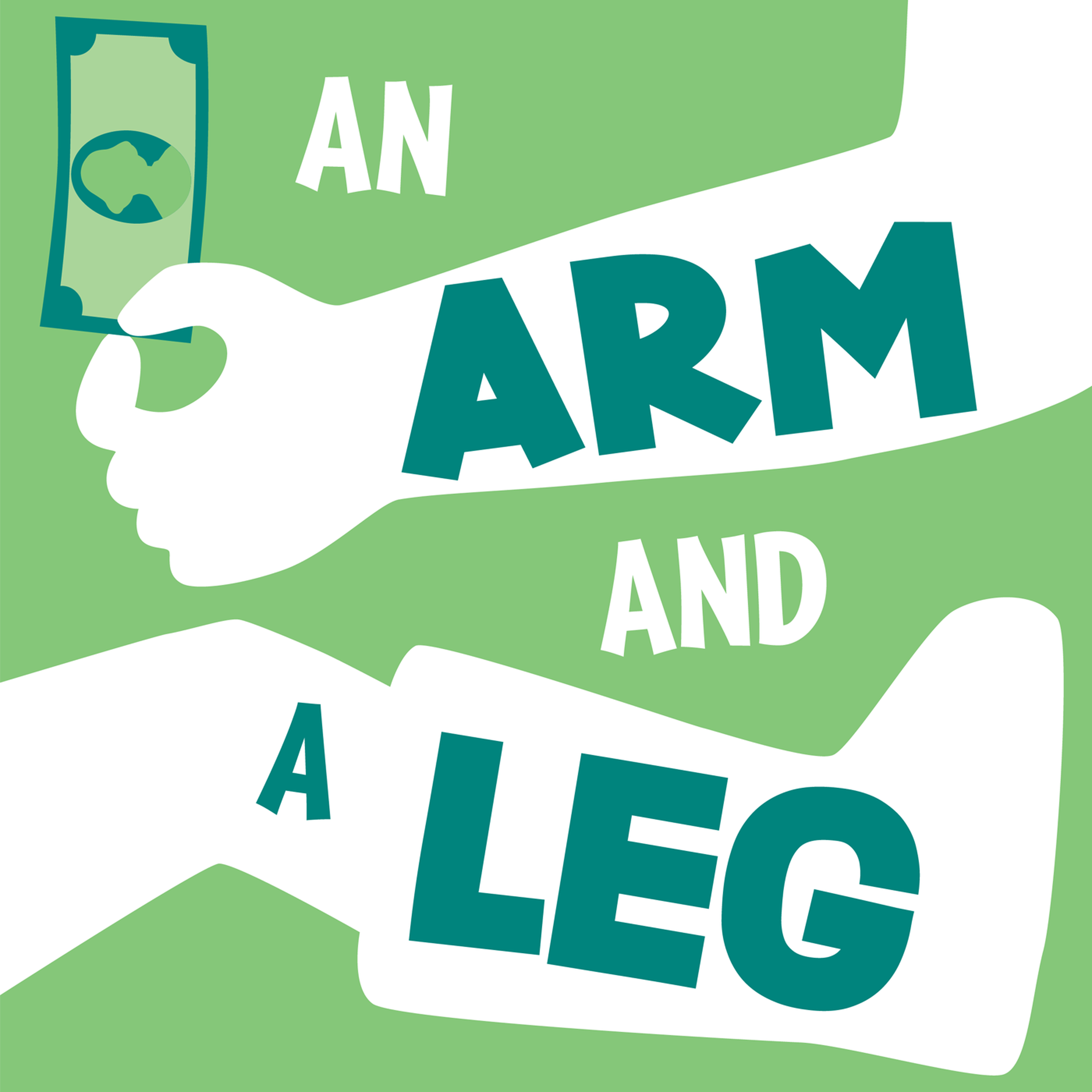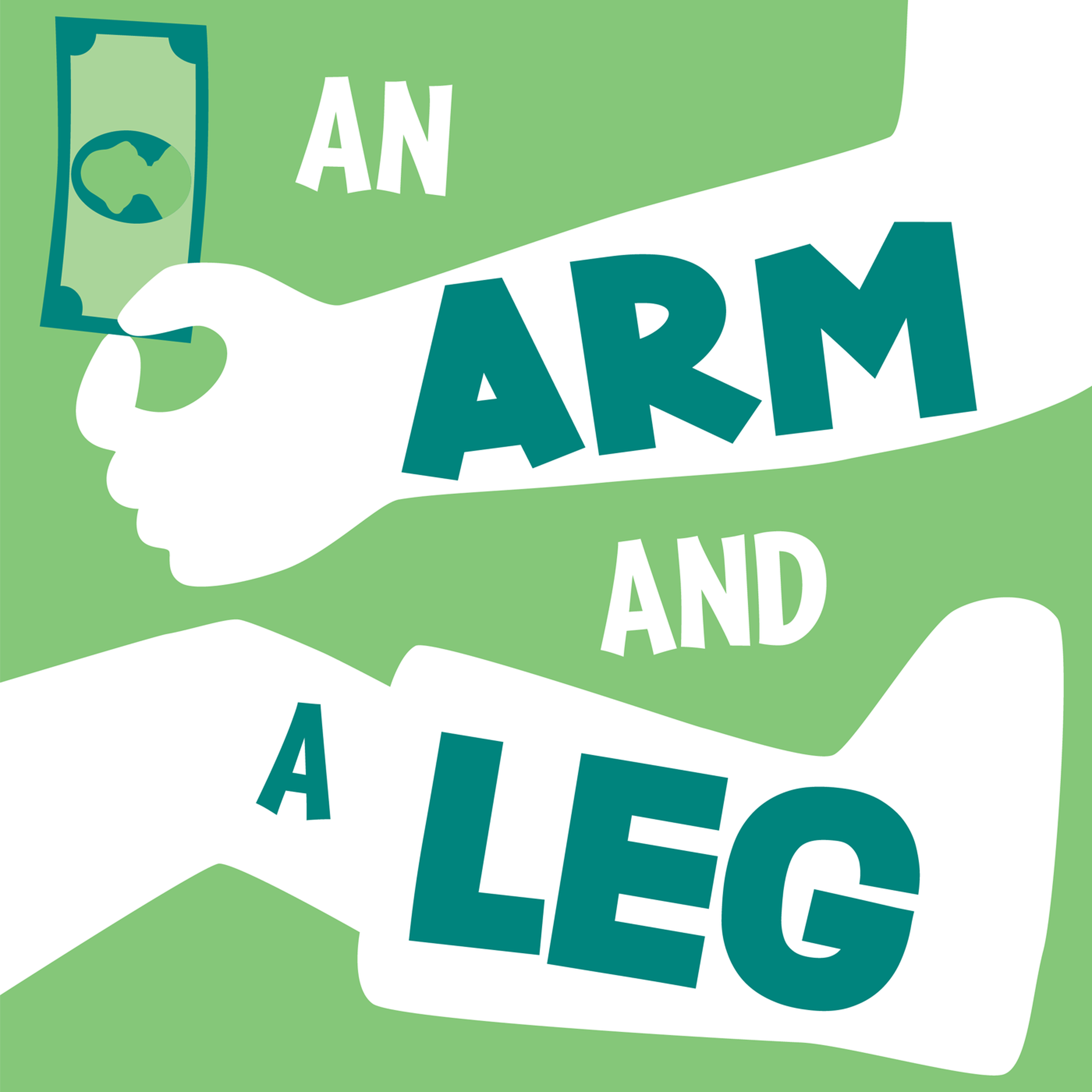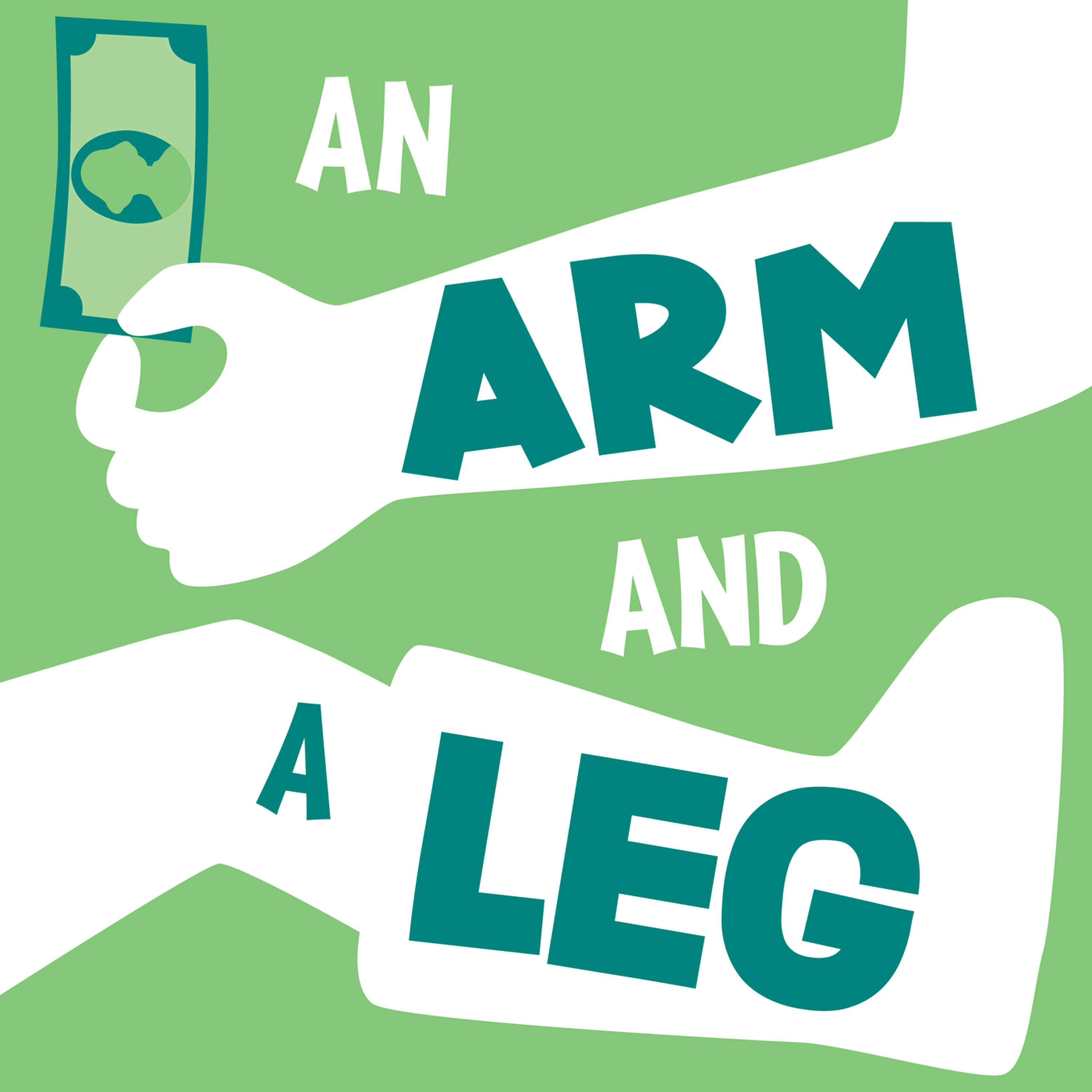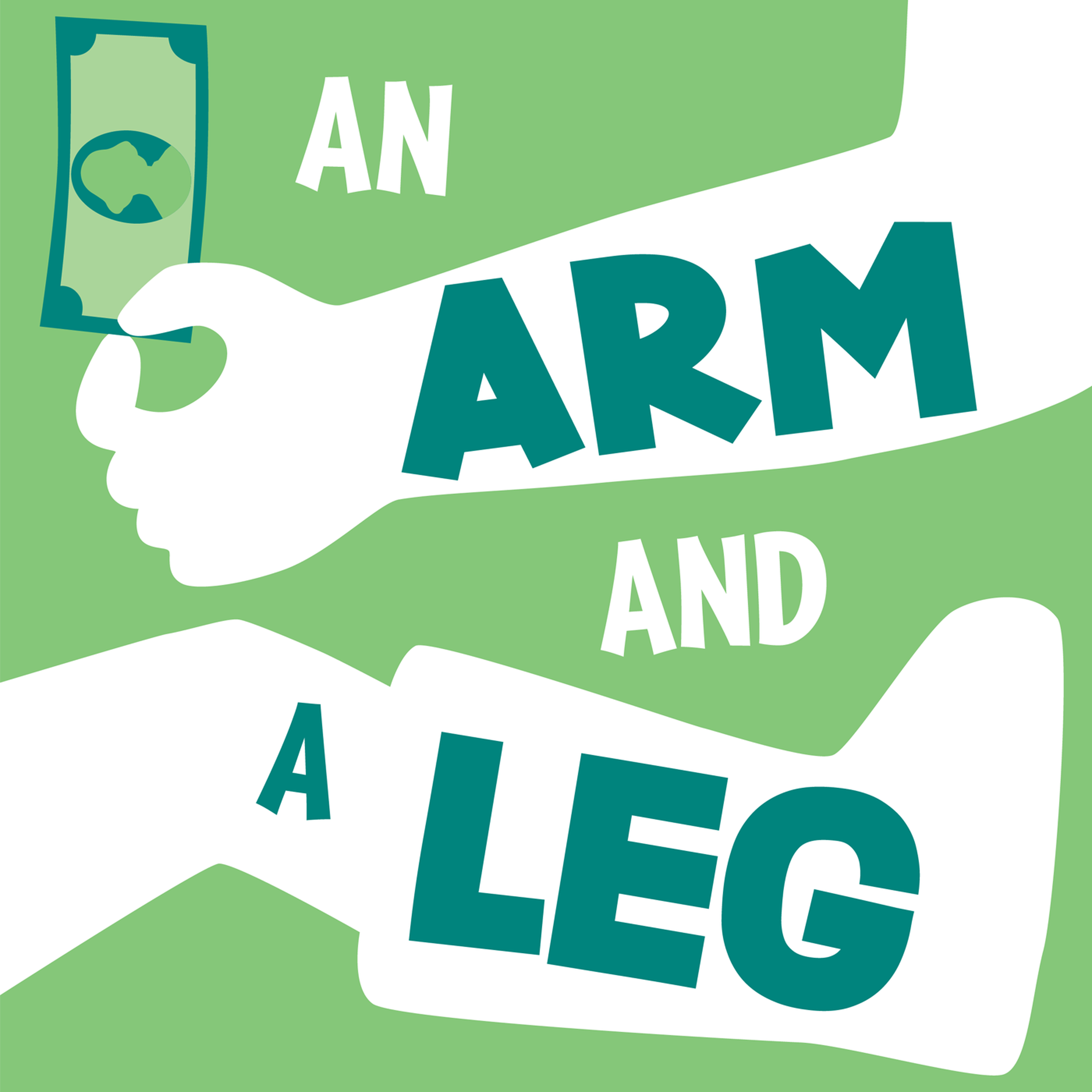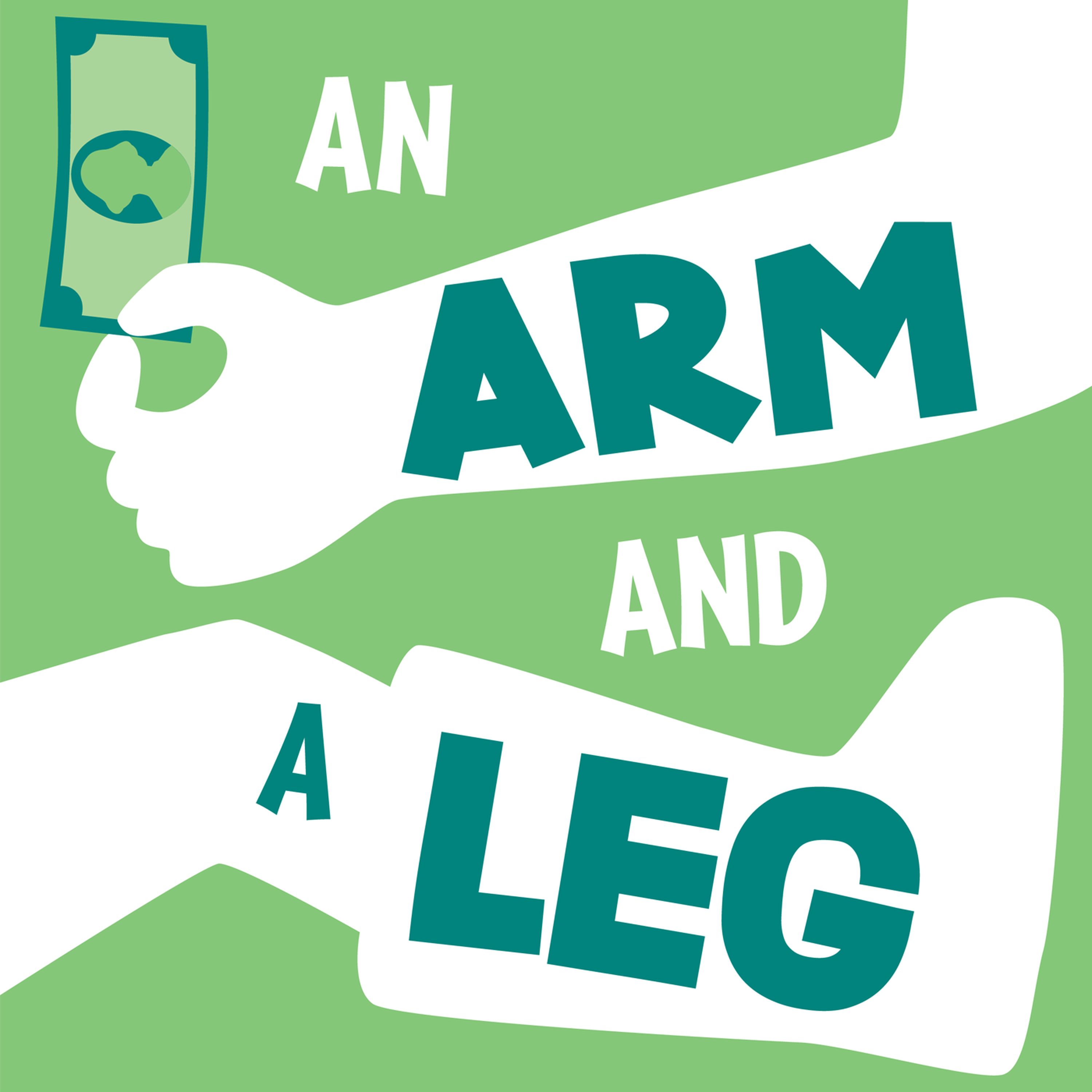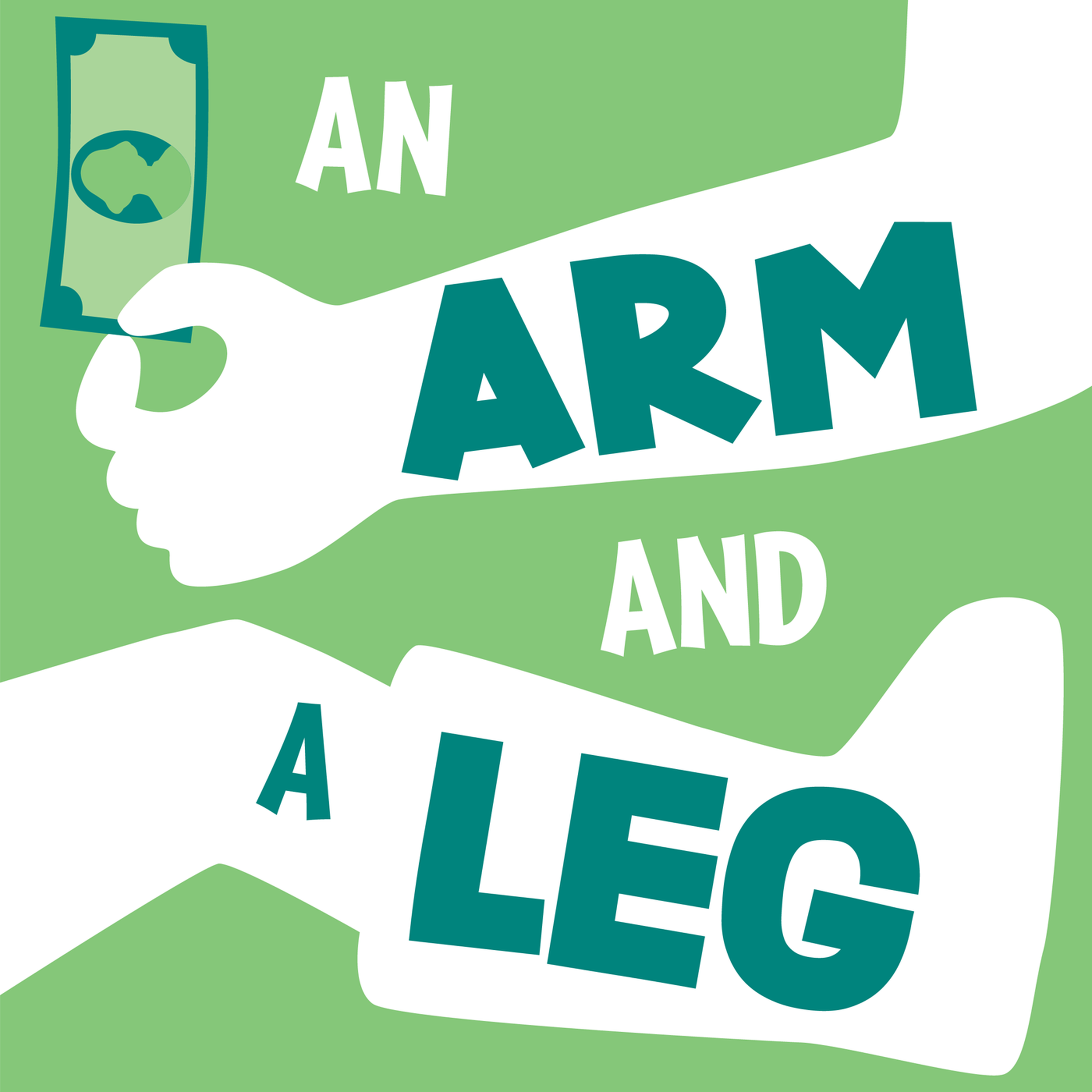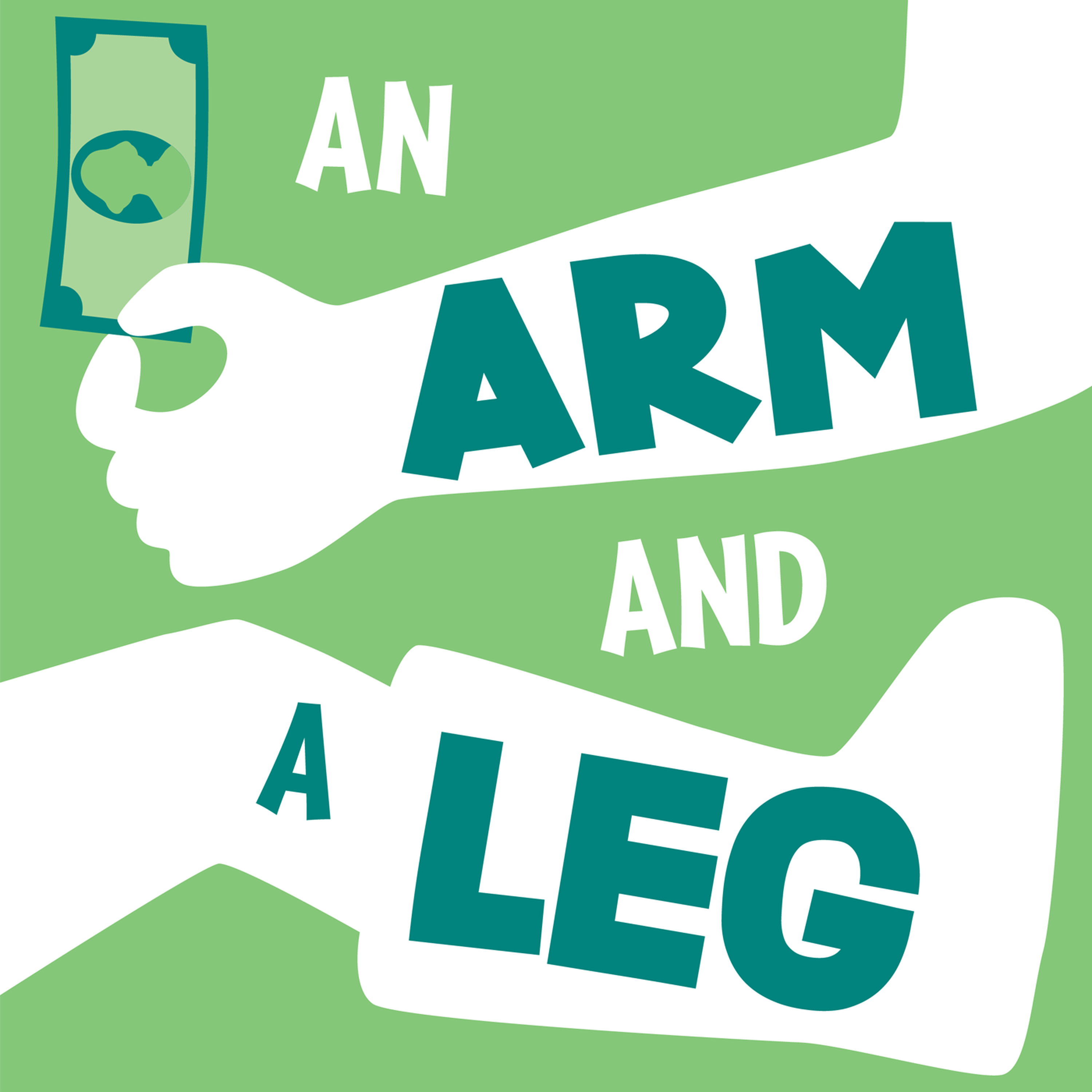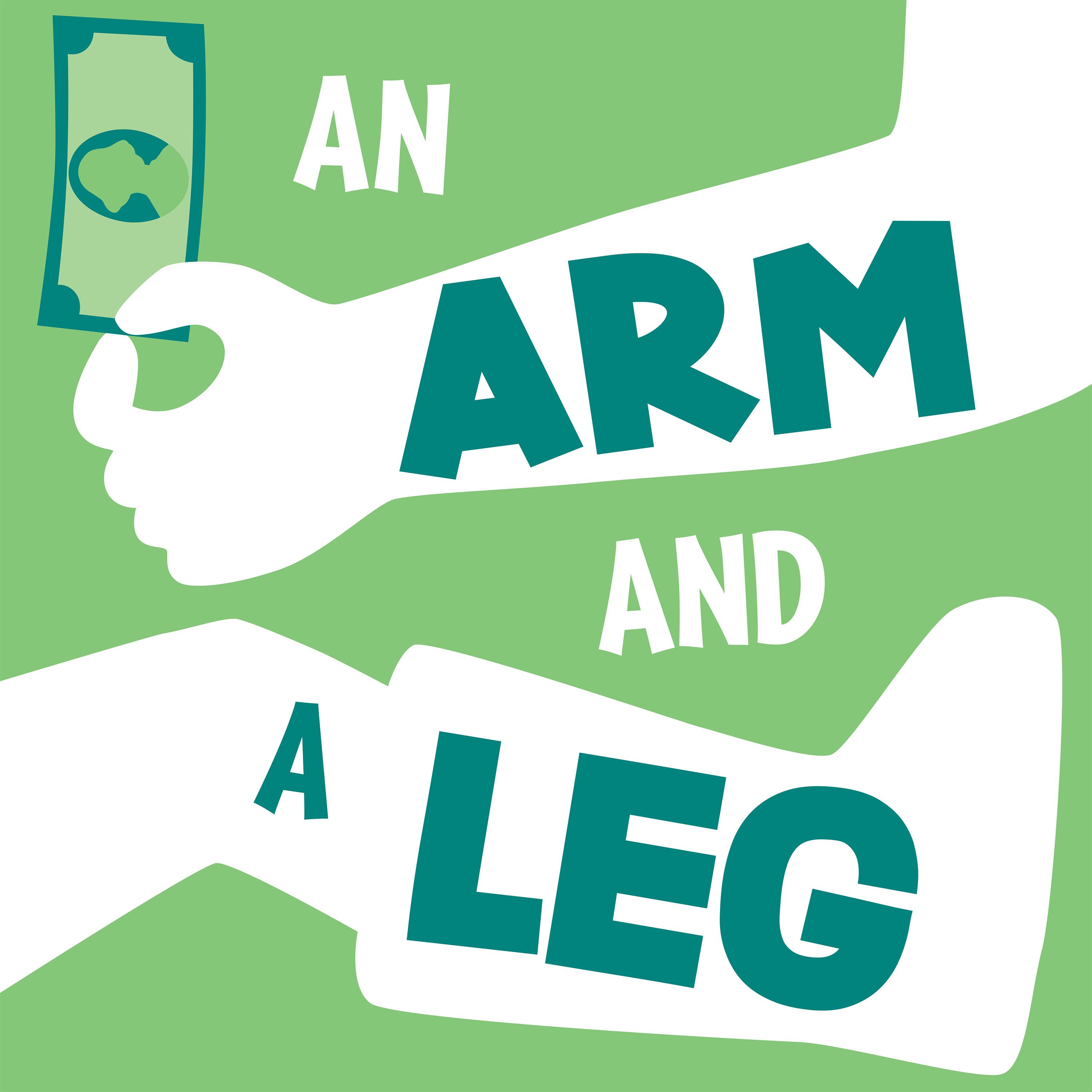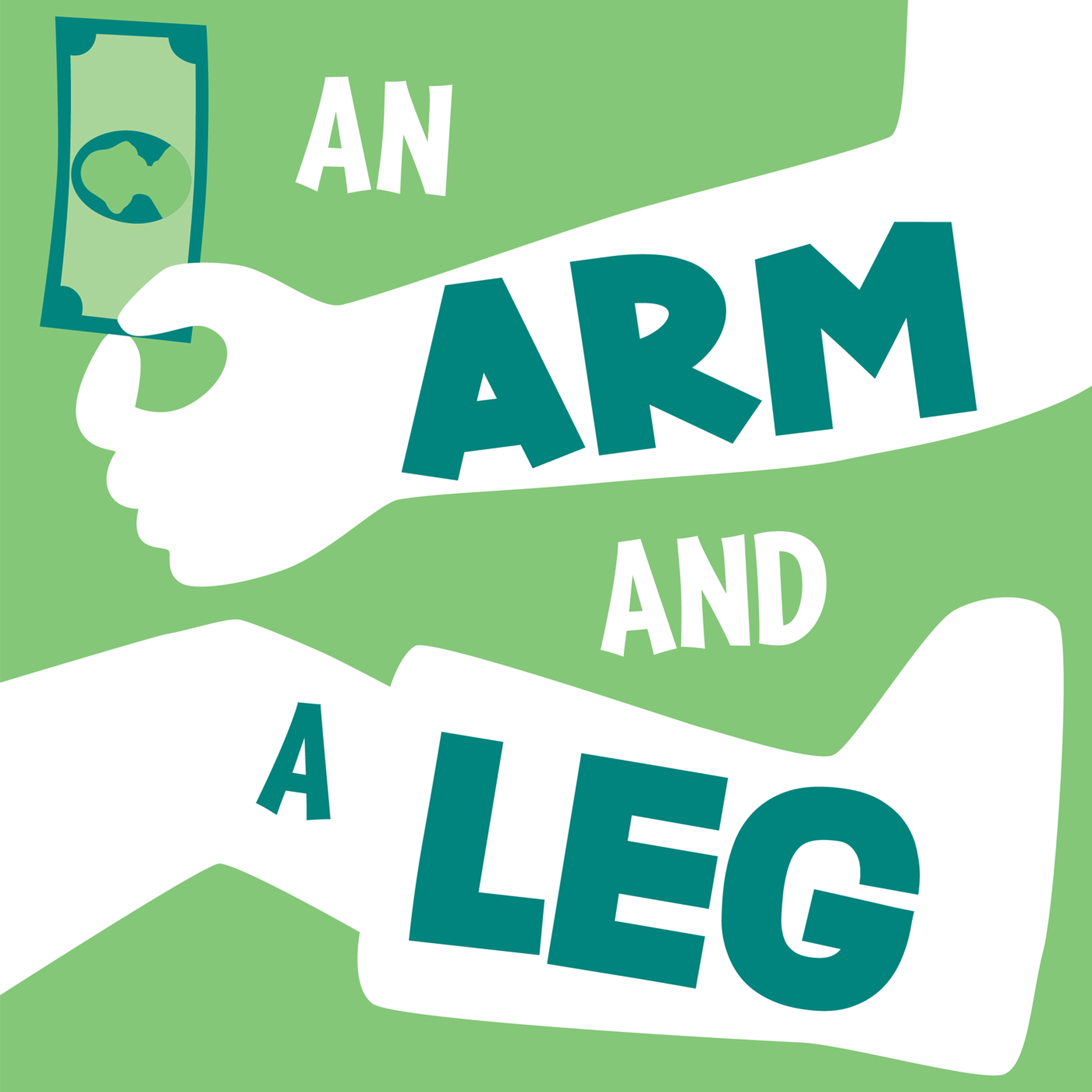An Arm and a Leg
A show about the cost of health care that’s more entertaining, empowering, and occasionally useful than enraging, and terrifying and depressing. Reporter Dan Weissmann digs in to show how we got into this crazy mess and how we just might live through it.
With COVID vaccinations ramping up, it's time to check in: Who's been trying to make a buck? And who's been doing their best to serve the folks who need help the most? In Philadelphia, the good, the bad, and the ugly have all been on vivid display.
The Bad comes with a giant serving of chutzpah: For a while, the city put its mass-vaccination program in the hands of a 22 year-old with no experience in health care, but with a healthy interest in making money. It did NOT go well. (You may have seen that headline before. We get the deep dive from public-radio reporter Nina Feldman, who uncovered the caper.)
The Ugly is systemic racism: Or is it just a coincidence that the city put its trust in a white 22 year-old... while ignoring an effective group of licensed, experienced, Black health-care professionals who were volunteering their time? That would be the Black Doctors COVID-19 Consortium, led by Dr. Ala Stanford.
The Good is the work that Dr. Stanford and the Consortium have been doing, which throws the Bad and the Ugly into stark relief. Since last spring, they've been working tirelessly and creatively to address disparities in the care that Black Philadelphians receive for COVID-19.
They're not the only folks working to address those disparities—including a lack of good vaccine information from trusted sources. Here's a great example from a project called The Conversation: Between Us and About Us, hosted by comedian W. Kamau Bell:
You can watch it here: https://www.youtube.com/watch?v=qp6S4C6zG_M
We talked with one of the project's leaders, Dr. Rhea Boyd, author of a recent New York Times essay, Black People Need Better Vaccine Access, Not Better Vaccine Attitudes. (Disclosure: The project is backed by the Kaiser Family Foundation, who also are behind our co-producers at Kaiser Health News.)
Here's a transcript for this episode.
Send your stories and questions: https://armandalegshow.com/contact/ or call 724 ARM-N-LEG
And of course we'd love for you to support this show.
See acast.com/privacy for privacy and opt-out information.
We're re-releasing and updating a story we first reported in 2019, about how insulin got to be so horribly expensive—the scientists who discovered it did NOT want price or profits to keep it away from people who need it—and what some people are doing about it, today.
The story seems especially relevant right now, for two reasons:
- the COVID vaccine process has reminded all of us how vital it is to BOTH get breakthroughs in the lab AND to make sure everyone can afford to benefit from them.
- The second half of the episode—about ways that folks who need insulin are taking action on their own behalf—turns out to have been a sneak preview of this show's current focus on self-defense.
Also, the whole thing is a wild ride. And: The updates from people we talked to in 2019? All more encouraging than we'd expected.
Here's a transcript for this episode.
Send your stories and questions: https://armandalegshow.com/contact/ or call 724 ARM-N-LEG
And of course we'd love for you to support this show.
See acast.com/privacy for privacy and opt-out information.
Yep. This viral TikTok video's recipe for "crushing" medical bills is legally sound. And IRS filings from thousands of hospitals attest to $2.7 billion of crush-able debt from a single year— a number that experts say looks more like a floor than a ceiling. Of course, it'll take a lot of work to actually zap those debts. But Jared Walker is off to a promising start. His organization, Dollar For, had already helped wipe out millions in medical bills before he made that video.
See acast.com/privacy for privacy and opt-out information.
Jeff is a lawyer who used to represent medical-bill collectors in court. ("I was a bad guy, for sure," he says.)
But he switched sides, and he's here to tell us what he knows. For instance, we have more rights than we probably know.
It can be tough to get them enforced, but he's got some tips there too.
And his portait of how the dark machinery works is... kind of hilarious.
Here's a transcript for this episode.
Send your stories and questions: https://armandalegshow.com/contact/ or call 724 ARM-N-LEG
And of course we'd love for you to support this show.
See acast.com/privacy for privacy and opt-out information.
2021 is off to a rough start, but we've got a couple of small things that don't completely suck.
First, a new federal rule could help cut through one completely-ridiculous issue. Then, a listener describes how he headed off an insurance nightmare, using what he learned from this show.
Dan talked about the first story—a requirement that hospitals give us some information upfront about what a given service might cost us (after insurance, if we've got it)—in a short conversation with Niala Boodhoo for the daily-news podcast Axios Today.
You'll find a LOT more detail on that rule in this story from reporter Celia Llopis-Jepsen (whose reporting about a $50,000 "air ambulance" ride formed the core of a recent episode about how we get squeezed by insurers on one side and providers on the other).
Here's a transcript for this episode.
Send your stories and questions: https://armandalegshow.com/contact/ or call 724 ARM-N-LEG
And of course we'd love for you to support this show.
See acast.com/privacy for privacy and opt-out information.
Former health-care executive Wendell Potter spent part of 2020 publishing high-profile apologies for the lies he says he told the American people in his old job—and trying to debunk the myths he once sold. The story of how he became a whistle-blower is a modern-day Christmas Carol. And it's a story about the long, messy process of change—whether that’s changing your own life or trying to change a bigger system.
It’s a great way to close out a pretty-terrible year.
Another cheerful note: THANK YOU!!! Your support for this show has MAXED OUT the matching program NewsMatch. It’s a huge, huge boost for our work in 2021.
Of course, we could still use your support before the year ends. We would love it. There is SO much work ahead.
AND, if you’re looking for other places to help out, here are a few places doing powerful work:
- Remote Area Medical runs free pop-up clinics— and seeing one played a role in Wendell Potter’s move from Scrooge to whistle-blower.
- Get Us PPE helps front-line workers get the personal protective equipment they need to stay safe during the pandemic. (And yep, that is still a thing. Grrr…)
- RIP Medical Debt pools money to buy up old medical debt and forgive it. By doing bulk transactions, they can take a $5 donation and use it to discharge $500 in debt. (We featured their work in a 2019 episode, Christmas in July.)
- MLK 50: Justice Through Journalism does powerful investigative reporting. After they exposed how the biggest hospital in Memphis was suing patients over unpaid bills, the hospital was shamed into dropping thousands of lawsuits and erasing almost $12 million in debt.
And of course it is absolutely not too late to support this show. Here’s that link: https://armandalegshow.com/support/
Send your stories and questions: https://armandalegshow.com/contact/ or call 724 ARM-N-LEG
See acast.com/privacy for privacy and opt-out information.
This episode turns the tables: Host Dan Weissmann gets interviewed about what he's learned this year, and what's ahead for the show— with T.K. Dutes, an ace radio host and podcast-maker ... who was a nurse in a previous life, so she knows a thing or two about the health-care system. (She chronicled her career transition in an episode of NPR's Life Kit.)
And here we learn: During her nursing career, she was uninsured. She's got some stories about life before-and-after health insurance.
T.K. also coins what could be a new tagline for this show: "Where there's money, there's going to be scams."
Check out Open World, a terrific podcast T.K. published recently with fellow superstar Rose Eveleth. The first episode features a reading by and discussion with the writer N.K. Jemisin, who won a MacArthur "genius" award the day after the show came out. (Clearly, the MacArthur folks were listening.)
Support us: During November and December 2020, your donation counts for DOUBLE, thanks to a campaign called NewsMatch. So cool. You can make a one-time donation OR make an ongoing monthly pledge. Here’s the link: https://armandalegshow.com/support/
Send your stories and questions: https://armandalegshow.com/contact/ or call 724 ARM-N-LEG
See acast.com/privacy for privacy and opt-out information.
Keeping the plan we've got means paying $200 a month more. But... would a "cheaper" plan cost us more in the long run? It depends! And COVID makes it a lot more complicated. This stinks.
You can hear my wife and me try to puzzle the whole thing out, and then I debrief with an expert. Who leaves me reminded how lucky we are to have the options we do. HEALTH INSURANCE SUCKS.
But the alternative is so much worse.
If you want to go deeper on health insurance, you might want to check these episodes from our first season:
- In Why you (and I) will likely pick the wrong health insurance, we learn: Smart economists have proved it's actually super-hard—even they aren't sure they'll pick correctly— and most of us don't even know the vocabulary, or how to do the math. (It's not our fault, either.)
- Why health insurance actually sucks illuminates one big answer: Insurance companies allow a LOT of price-gouging. And often WE end up paying those prices. Argh. It really does suck.
- In the first-ever episode of this show, my family confronts the big puzzle: Can we even get insurance that'll work for us?
- In A "deal" on health insurance comes with troubling strings, we go on a journey with a kinda-famous "financial therapist" who says she gets rattled when it comes to picking health insurance. And she's pretty uncomfortable—morally, personally—with some of the choices she's made. (Also, my family makes another cameo.)
And here are some other helpful big-picture takes:
- Listener Anna Jo Beck made a really great booklet explaining how health insurance works. It's a zine! You can read it online.
- I borrowed some core insurance-picking advice—consider what a health plan does for you if you get hit by a bus—from this great story by Zachary Tracer at Business Insider, spelling out how he picked his insurance.
Want to go really deep? Like, you're actually looking at buying health insurance, maybe on the Obamacare exchange?
- I found healthcare.gov to be SUPER-usable this year, way better than last time I checked: I punched in the answers to a few questions, and got to quickly tell it which doctors our family sees (and what meds we take)... and it provided a clear list that showed which plans cover our docs, how much they would cost us, etc.
- SUBSIDIES ARE AVAILABLE FOR OBAMACARE PLANS. Our pals at the Kaiser Family Foundation—who run Kaiser Health News, our production partners— have this explanation of how they work. (It's a slog, but thorough. Print it out, open a beer, and settle in.)
- Remember how we said in this episode that lots of folks qualify for a plan with no premium? That's this bit of research from...
See acast.com/privacy for privacy and opt-out information.
Andy Slavitt, who ran a big chunk of health care for the Obama administration, has spent 2020 talking with almost everybody who knows anything about the COVID pandemic— and sharing what he learns in real time, first on Twitter, then on his pandemic podcast "In the Bubble." When we wanted an episode taking a look at the big picture—what we've learned so far from the pandemic and what we might expect next—Andy was the person we wanted to talk to. And he said yes!
We got into the money side of what we can expect with vaccines and testing, and treatment—which wasn’t always pretty but wasn't all bad news—and we ended up with some really big-picture questions about the profit motive in health care.
Support us: During November and December 2020, your donation counts for DOUBLE, thanks to a campaign called NewsMatch. So cool. You can make a one-time donation OR make an ongoing monthly pledge. Here’s the link: https://armandalegshow.com/support/
Send your stories and questions: https://armandalegshow.com/contact/ or call 724 ARM-N-LEG
See acast.com/privacy for privacy and opt-out information.
They're supposed to be free. And usually they are. But sometimes... things happen. Here's how to keep them from happening to YOU.
New York Times reporter Sarah Kliff has been asking readers to send in their COVID-testing bills. She's now seen hundreds of them, and she runs down for us the most common ways things can go sideways, and how to avoid them.
Here's Sarah's NYT story that inspired this episode.
Support us: During November and December 2020, your donation counts for DOUBLE, thanks to a campaign called NewsMatch. So cool. You can make a one-time donation OR make an ongoing monthly pledge. Here's the link: https://armandalegshow.com/support/
Send your stories and questions: https://armandalegshow.com/contact/ or call 724 ARM-N-LEG
See acast.com/privacy for privacy and opt-out information.
Possibly our most-useful episode ever. A listener asked: How do I remain cool when calling insurance companies?
We called a veteran self-defense teacher— because self-defense means a lot more than hitting and kicking. It's about standing up for yourself in all kinds of difficult situations. Which means using your words.
Lauren Taylor talks us through some of her top strategies, and how she used them this year in her own epic health-insurance fight.
Send your stories and questions: https://armandalegshow.com/contact/ or call 724 ARM-N-LEG
Support us: During November and December 2020, your donation counts for DOUBLE, thanks to a campaign called NewsMatch. So cool. You can make a one-time donation OR make an ongoing monthly pledge. Here's the link: https://armandalegshow.com/support/
See acast.com/privacy for privacy and opt-out information.
In a classic—and hilarious—David vs. Goliath story, Jeffrey Fox takes on a huge hospital over an outrageous bill, and wins.
He's a bit of an expert in using small claims court to get satisfaction, and he's got detailed instructions for all of us.
Here's his first lesson: The other side—no matter how big they are, and no matter what they say to you—doesn't actually get to make the rules. Not the LEGAL rules.
The details of how he got to victory in this case are super-entertaining, and super-satisfying.
Support us: You can now make a one-time donation OR make an ongoing monthly pledge.
AND: During November and December 2020, your donation counts for DOUBLE, thanks to a campaign called NewsMatch. So cool. Just click here to give: https://armandalegshow.com/support/
Want more detail on this whole small-claims-court strategy? Got you covered:
- Some folks have used just the threat of small claims court to get outrageous bills lowered. You'll hear all about it in our 2019 episode Can They Freaking DO That?!?: https://armandalegshow.com/episode/can-they-freaking-do-that/
- Law professor Christopher Robertson describes some of the legal theory behind this approach in a Harvard Law School blog post: https://blog.petrieflom.law.harvard.edu/2017/10/03/medical-bills-are-open-price-contracts-a-victory-for-the-little-guy/
- Jeffrey Fox posted documents from his case, and a brief narrative:http://blog.petrieflom.law.harvard.edu/wp-content/uploads/2017/10/Writeup-1.pdf
- Finally, here's this episode's transcript: https://armandalegshow.com/wp-content/uploads/2020/10/Arm-and-a-Leg-Transcript-S4-Ep07-David-v-Goliath-Published-Oct-29-2020.pdf
Send your stories and questions: https://armandalegshow.com/contact/ or call 724 ARM-N-LEG
See acast.com/privacy for privacy and opt-out information.
There's a reason Shaunna Burns went viral with her videos about dealing with debt collectors: She used to be one, so she knows a few things. (Also she's smart and funny.) We fact-checked her advice with a legal expert: Jenifer Bosco, an attorney with the National Consumer Law Center. Who said: Yep, most of Shaunna's advice totally checks out.
This one's full of useful tips—and it's fun— so please pass it around. Debt collectors are out in force, and as you'll hear in this episode, they can be super-unscrupulous. But, as you'll also learn: We've got rights.
You don't need to have heard our earlier episode about Shaunna and her story; you can just start right here. (There's lots of strong language in both this and the previous Shaunna episode, so maybe save them for when the kids aren't around.)
Meanwhile, here's a bunch of links to resources:
The National Consumer Law Center, where Jenifer Bosco works, publishes the book Surviving Debt
- There are chapters on medical debt, dealing with debt collectors, and what to do if you get sued
- The book is updated every year
- It's free to read online at https://library.nclc.org/sd
Consumer-finance expert Gerri Detweiler, who helped fact-check one big question for this episode, has a VERY useful-looking site: https://www.debtcollectionanswers.com/
- She just published a new article with answers to questions like "Can medical bills be sent to collections if you're making payments?" (yep) and "How do I dispute a medical bill in collections?
- There's another, more-general primer on medical debt/collections, also updated recently.
- Gerri and co-author Mary Reed offer their e-book Debt Collection Answers as a free download. (It was published in 2015, so it may not be as up-to-date.)
Shaunna's dealing-with-debt-collectors TikTok videos
Be sure to note Jen Bosco's legal caveats, but these are great and will get you in a fighting spirit
- Rapid-fire advice: They can't just call whenever they want. There's a statute of limitations on debt. You can— and should — demand documentation.
- If they can't document that this debt is valid... you've got options.
- You're under no obligation to give them any information.
- If the debt is valid, BE NICE. Take their calls. You may eventually be able to work out an OK deal.
Send your stories and questions:
See acast.com/privacy for privacy and opt-out information.
Forty-something mom Shaunna Burns went viral on TikTok, thanks in part to a series of videos dishing out real-talk advice on fighting outrageous medical bills. She's become the virtual mom that thousands of Gen-Z followers love. She's funny, smart, and relatable—and she's got stories that'll make your hair stand on end. (Yep, medical bills figure into some of them.) Oh, and she can swear like a f---ing sailor. So maybe save this one for when the kids aren't around.
Send your stories and questions: https://armandalegshow.com/contact/ or call 724 ARM-N-LEG
Support us: https://www.patreon.com/armandalegshow
See acast.com/privacy for privacy and opt-out information.
Laura Derrick fought and endured for decades. When medical bills threatened to swamp her family, she made huge sacrifices, worked unbelievably hard... and helped change the course of history. In a moment when we're all enduring a LOT, it seemed like a great time for Laura's story. It's one of the first stories we ever told on this show, and it has special resonance right now. Bonus: We catch up with Laura for an update.
See acast.com/privacy for privacy and opt-out information.
Steve Benasso is an HR director who, his colleagues will tell you, hates insurance companies, and hates seeing people getting taken advantage of. So he fights off weird medical bills and bogus insurance denials for those colleagues. "I am a bulldog on this stuff," he says. "I do it every month." And on this episode, he tells us how he does it.
Send your stories and questions: https://armandalegshow.com/contact/ or call 724 ARM-N-LEG
Support us: https://www.patreon.com/armandalegshow
See acast.com/privacy for privacy and opt-out information.
If you need medical care, it's like you've entered a casino, playing for your financial life, with the deck stacked against you. Lucky for us, we get insight — and tips the dealer WON'T tell you— from ace reporter Celia Llopis-Jepsen.
To start with, she got an executive from a health-care company to talk honestly — maybe more honestly than he realized — about how his company and others are playing the game, when they send patients bills for huge amounts.
Here's what else she found, when she investigated an $80,000 bill one man got: For many COVID patients, including the guy in her story, lots of providers just aren't allowed to bill for more than insurance pays them.
Those are providers who took some of the $175 billion in bailout funds that Congress passed out in March. Don't expect your provider to just tell you. (That $80,000 bill did not include a footnote saying, "Once insurance pays us, you can forget all about this.") But if you get a bill for COVID treatment, you can make your own luck and look up the provider yourself. Because Celia found a government database where you can SEE if your provider took those funds.
We also like Celia's Expert tip sheet for pushing back against your medical bills.
... and her first big medical-bill story— A Kansan's $50k Medical Bill Shows That You Don't Always Owe What You're Charged— is packed with insight too.
Note: When this episode was first posted, our host mis-pronounced the first name of a man who received an $80,000 bill. He is Anil Garmalkar. The audio has been corrected.
We are bringing you these self-defense lessons every two weeks from here on out. That's thanks to direct support from listeners. We'd love for you to support us too: https://armandalegshow.com/support/
See acast.com/privacy for privacy and opt-out information.
There's no time like a pandemic to (a) learn to fight back against the awful cost of health care. And (b) have a good time doing it. Yep. Let’s go.
See acast.com/privacy for privacy and opt-out information.
Barbara Faubion got up every day psyched to go to work—which she says puzzled her friends. “They’d go, ‘You love your job?!? You spend your whole day talking to an insurance company. Are you kidding me?’”
She wasn’t kidding. Because she loved to win—and she was really, really good at untangling other people’s health-insurance problems.
She's here to teach us what she knows.
And we'll learn something else too, from a conversation with ProPublica reporter Marshall Allen: Why doesn't EVERY health insurance broker have someone like Barbara on staff? This story he did in 2019 has some big clues.
Send your stories and questions: https://armandalegshow.com/contact/ or call 724 ARM-N-LEG
Support us: https://www.patreon.com/armandalegshow
(Audio excerpt from “Going Down Now” used with permission. ℗&© 2020 The Rockmores. Published by The Rockmores, Boston, MA www.therockmores.com. All rights reserved. Unauthorized use is a violation of applicable copyright laws.)
See acast.com/privacy for privacy and opt-out information.
We wrap up our COVID-19 popup season with stories from three folks with very different takes on what we've learned so far about what the pandemic is costing us: A doctor and advocate in Brooklyn looks back on the wave of black and brown patients that filled her clinic in March. A nurse-practitioner in Texas looks at how new tech is—and isn't—helping the older patients she cares for.
And: One of the country's top insurance nerds says her first policy ideas to keep people from getting stuck with high bills for COVID tests ... were wrong.
Get ready for the hug shortage, the new abnormal, and the $7,000 COVID test.
And: Help guide the next steps for this show! Take five minutes for our listener survey. We so appreciate it.
Thanks to everyone who supports the show on Patreon. You can join 'em here: https://www.patreon.com/armandalegshow
See acast.com/privacy for privacy and opt-out information.
In early April, Katelyn was in a financial bind: Home sick with COVID, she hadn't been paid in weeks. And bills were due. "My landlord is kinda beating down my door right now," she said in a voicemail to our hotline.
Weeks later, Katelyn got back in touch: She had made it through, thanks to a combination of playing hardball with one company and knowing how to play nice with others.
Because of her job, she had an insider's understanding of the playing-nice process: Katelyn works in collections for a financial institution, so she knew how to ask for help. Even so, she didn't find the process easy.
She came out of the ordeal with a heck of a story, and hard-won tips for all of us.
In addition, here are a couple of resources mentioned in this story:
- A collection of tips on dealing with medical bills and collection agencies, from one of our favorite teachers: TikTok mom Shaunna Burns.
- Hello Landlord is a free online tool that automatically generates letters you can send to your landlord, asserting your legal rights. (Right now, those rights may include some federal protections avainst evictions.)
You can call and leave us a message too: (724) 267-6534 — that's 724 ARM N LEG
Or share stories at https://armandalegshow.com/contact/
Thanks to everybody who supports our work! Join 'em here: https://www.patreon.com/armandalegshow
See acast.com/privacy for privacy and opt-out information.
A listener, who has worked in health insurance for decades, wrote in. "I have listened to all the episodes in this podcast, and there are times I come away feeling bad working for the insurance company."
We talked. Along with angst, she shared insights and advice we all can use.
See acast.com/privacy for privacy and opt-out information.
You've probably noticed: The U.S. economy is crashing.
Something you may not have noticed, that may sound really weird: Almost half of that economic devastation comes from just one sector.
And that sector? It's health care.
If that sounds completely backwards, it is. Except in the world of how we pay for health care in this country.
Because even though we as a society need health care workers like never before, to fight COVID...
... we-as-individuals are avoiding doctors' offices and hospitals for everything else, whenever we can. Just like we're avoiding going out to eat.
And this country runs health care kind of like the restaurant industry: When people stop showing up for Sunday brunch— or for hip replacements, colonoscopies, etc. —the enterprise runs short of cash real fast.
Even folks you'd think would be the most in-demand — ER docs fighting COVID—aren't immune.
In this episode, we look at some of the extra weird details of this very-weird recession: how a couple pieces of it are working, and what they could mean. For our wallets.
We draw in this story on stuff we covered in a Season 3 episode called Can They Freaking DO That?!? It's still fun and relevant, and you can catch it right here.https://armandalegshow.com/episode/can-they-freaking-do-that/
Thanks to everyone who supports this show on Patreon! Join 'em, and we'll shout you out at the end of an episode: https://www.patreon.com/armandalegshow
See acast.com/privacy for privacy and opt-out information.
Anna's insurance company said it would pay 100 percent for COVID-related testing. And then they left her to pay a giant bill.
She got help, thanks to a viral tweet, but... her story exposes big loopholes in consumer protections. We learn how to avoid falling in.
And: The way people responded to her tweet was generous, moving, and... complicated. Uncomfortable. Weird. Even with everybody doing their absolute best. (And, we should say, with as happy an ending as any of us get these days.)
Anna's story gets right to the heart of some of the really weird ways that dealing with the cost of health care — ESPECIALLY in the world of COVID-19 and the Internet and everything else — just messes with our minds, and our relationships as humans.
Thanks to Carmen Heredia Rodriguez, who reported the story of Anna's bill for Kaiser Health News and kindly let me piggyback on her hard work! You can read her version at.https://khn.org/news/bill-of-the-month-covid19-tests-are-free-except-when-theyre-not/.
Send your stories our way: https://armandalegshow.com/contact/
And support our work: https://www.patreon.com/armandalegshow
See acast.com/privacy for privacy and opt-out information.
Ryan Gamlin spent a decade working on the financial side of health care, before going to medical school. Now, as an anesthesiologist in Los Angeles, he’s on the front lines fighting COVID-19, an experience he describes as “scary, in a way that I never expected to be scared, going to work.”
He was scared one day last summer, too, when a California wildfire came within feet of the hospital where he was working.
And then a fleet of fire trucks showed up to protect the hospital. “City, county, park service, forest service, new trucks, old trucks, unmarked trucks.”
“As I drove home later that day through the protective ring of equipment, I realized the fundamental difference between public safety and health care. Public safety is built on latent capacity. We pay for people and equipment to stand idle, over-prepared for emergencies.”
These days, he’s been thinking back to that experience.
“We’ve left no latent capacity in health care,” he wrote in a Twitter thread.
“And some part of the tragedy that’s now unfolding in this country is because of that. Because we let health care become a business. And because businesses don’t keep a hundred extra fire trucks around, their crews trained and ready, just in case.”
We talked with Ryan about his experiences for this week’s episode. With protective equipment in short supply, he said, "It felt like a fire, with no one to call."
We ALSO hear some good news, about folks who are stepping up to help — tapping their own latent capacity.
That includes people making "ear savers" for health-care workers. Turns out, if you wear a mask all day, the elastic rubs the heck out of the skin behind your ears. Some people are 3-D printing connectors that go around the back of the head.
And some people are taking a more low-tech approach. Here's a picture of my friend and neighbor Liz Feldman is the medical director at a local clinic. She's modeling ear-savers that are basically fabric headbands, with buttons sewn in to hold the masks in place, made by a retired colleague from old t-shirts and scavenged buttons.
See acast.com/privacy for privacy and opt-out information.
Lots of people have insurance plans that only cover them with certain places —providers, certain hospitals.
But: in a COVID pandemic surge, who knows if you'd end up one of those places? And if you end up someplace else... then what?
That’s the question we got from a listener named Becky in Minnesota. She's got a Bronze plan — it only covers a limited "network" of providers— and she's got a $6,000+ deductible.
With officials talking about converting sports arenas into makeshift hospitals, Becky says: "If you call an ambulance, you may not even go to a hospital, right? Let alone a hospital that is quote-unquote in your network."
We put Becky's question to one of the country’s top health-insurance nerds: Sabrina Corlette, founder and co-director of Georgetown University’s Center on Health Insurance Reforms.
Not all the answers were comforting. But they weren't all grim either. And Becky turns out to have some good advice for us all.
And, per Sabrina Corlette's advice for anybody newly out of work — and suddenly without health insurance: Go apply for Medicaid.
As promised in the episode, here's a map showing which states have expanded Medicaid so that pretty much anybody who suddenly has very little income is eligible.
Please keep your questions and stories coming: https://armandalegshow.com/contact/
Or call (724) 276-6534 — that's (724) ARM N LEG
And as always, we'd love you to join us by supporting the show on Patreon: https://www.patreon.com/armandalegshow
See acast.com/privacy for privacy and opt-out information.
We kick off SEASON-19, about the cost of COVID, with a dose of hope — a story about an unlikely chain of people coming together to speed PPE to a COVID hospital in Brooklyn. NYC is a couple weeks ahead of the rest of the country, we think, so there are lessons here we can all get ready to use. Especially this: Don't be afraid that what you have to offer isn't enough. Take the step in front of you, even if it's a little one.
Here's a couple ways to start
- You can donate to that effort to get PPE to that Brooklyn hospital here: https://www.gofundme.com/f/artcube-army-ppe-supplies
- There are stories like this all over, big and small. And we want as many as we can find for SEASON-19. Tell us about the ones you know at https://armandalegshow.com/contact/
... or leave a message on our hotline: (724) 276-6534. That's (724) ARM N LEG.
See acast.com/privacy for privacy and opt-out information.
We were not expecting to bring the next season out for another couple months, but... STUFF has been happening. Is happening. We're here with you. Bring us your stories and your QUESTIONS: We'll ask the smartest people we know to tell us all what they know. go to https://www.armandalegshow.com/contact OR call our **hotline**! Yep: (724) 276-6534 -- which spells 724 ARM N LEG.
See acast.com/privacy for privacy and opt-out information.
This bonus episode turns the tables: Ace reporter Sally Herships interviews Arm and a Leg host Dan Weissmann, about what he's learned so far, and what's ahead for the show. \They dig into the stories listeners are sharing -- the lessons people say they’re learning, and the lessons they’re sharing.
And Dan previews the celebrations in store as the show hits a landmark: 500 Patreon supporters! If you haven't signed up already, there's still time to join us -- sign up by March 1 -- and earn some special rewards. https://www.patreon.com/armandalegshow
See acast.com/privacy for privacy and opt-out information.
Cathryn Jakobson Ramin, an investigative reporter with a bad back, spent years researching the $100-billion back-pain industry. She found that the most commonly-prescribed treatments, including surgery, frequently do not work — and often leave people a lot worse off. She also learned what does work. Whenever someone I know says their back is killing them, I send them a link to Ramin's 2017 book, Crooked: Outwitting the Back Pain Industry. In this episode, we hit the highlights of Ramin's findings.
See acast.com/privacy for privacy and opt-out information.
How one family's tragedy became, decades later, a $1 million gift to their neighbors. This story has everything: Laughter. Tears. Family. Community. Generosity. Softball. AND: Punk rock. John Oliver. A taco bar.
See acast.com/privacy for privacy and opt-out information.
They say the problem with relying on journalists to embarrass providers into caving on crazy bills is, there aren’t enough journalists to go around. Fair. But sometimes journalists can scale up.
In Memphis, reporter Wendi Thomas found that the city’s biggest hospital routinely sued its patients over unpaid bills, despite making tidy profits.
The hospital even sued its own badly-paid employees — a fact Thomas said was immediately visible just by visiting the court house. “You saw them, there, in their scrubs,” she said. “I could see their [hospital] badge clipped to the front of their uniforms.”
The injustices were stark. “The defendants are just outmatched,” Thomas said. “They don't have the resources of a billion dollar hospital with its own collection agency and attorneys.”
Thomas did such a good job making a stink about it that after a couple of months, the hospital dropped more than 6,500 lawsuits, and erased the debts.
“Shame is a powerful motivator,” said Thomas. “It just is. And the hospital didn't look good, so they had to address it.”
See acast.com/privacy for privacy and opt-out information.
A woman got a bill from a medical testing lab she’s never heard of, for $35. Then, a follow-up bill said if she didn’t pay up right away, that price was going up — WAY up: to $1,287.
Which raises a question that comes up a LOT with medical billing: Can they freaking DO that?!?
Can some random lab hit you up for money — and then threaten you with a late fee of more than $1,000??
On this episode, we go find out.
This was fun. We'll do it again. Next time you want to know, Can They Freaking DO That?!? ... get in touch.
Also: We get into a whole story in this episode about "surprise billing" — and as we were publishing this episode, news was breaking. We've got an update at https://www.patreon.com/armandalegshow
See acast.com/privacy for privacy and opt-out information.
Sarah Macsalka has seen the stories about how expensive an emergency room visit can be, even for a minor complaint.
So when her seven year-old son Cameron gashed his knee on a weekend morning in June, the ER was NOT where her family headed first.
In fact, Macsalka did just about everything she could to avoid paying a big, fat bill to get Cameron’s knee stitched up — and ultimately failed.
For instance, she took Cameron first to a local urgent-care clinic, but was told they didn't have anesthetic. So it was off to the ER.
Before signing anything, Sarah asked what it might cost and pressed hard — but got only squishy answers.
She ended up liable for $3,000 in charges. If only she had known.
“I would've said thank you very much. And walked out and gone back to our lovely urgent care and been like, 'Cameron, bite on this stick.'”
Her adventures make an entertaining parable, and they raise a big question: In a health care system where consumers are told to "shop" for the best deal, why is it so hard for us to get the information we need?
On this episode, we get some answers, thanks to a super-insider and straight shooter: Lisa Bielamowicz, a doctor who now runs Gist Healthcare, a consultancy firm where hospitals are the clients, gives us the dirt.
We'd love it if you support this show on Patreon. https://www.patreon.com/armandalegshow
See acast.com/privacy for privacy and opt-out information.
It would sound a LOT like Explanation of Benefits, which is a musical revue that actually played in New York City in 2019.
... so it would feature a parody of "Bills, Bills, Bills" — the 1999 Destiny's Child hit —rewritten for the age of GoFundMe.
And it would have smart, funny musical numbers tracing the long, sad history of the U.S. health care industry.
Welcome to our musical episode! And thank you to the young NYC troupe Heck No Techno for creating Explanation of Benefits.
Our episode isn't sung all the way through — it's more like the PBS documentary on Hamilton than an actual musical of its own. But that is still. Pretty. Darn. Cool.
AND: In keeping with our theme this season of self-defense against the cost of health care, Explanation of Benefits wraps with a set of short vignettes demonstrating ways patients can work to protect themselves from excessive charges.
So we have included here an email-by-email breakdown of songwriter Emily Lowinger's successful battle to fight off a surprise medical bill.
... and we've set it off with music — timing and cues lovingly adjusted by our audio wizard, Adam — and it is a TREAT.
Go enjoy. Have a great Thanksgiving!
... and speaking of thanks: I recently spent a weekend afternoon sending thank-you cards to folks who support this show on Patreon. I'd love it if you became one: https://www.patreon.com/armandalegshow
See acast.com/privacy for privacy and opt-out information.
Meredith Balogh has spent years learning to navigate the financial side of the health-care system. She’s a type-one diabetic, she’s never had a lot of money, and for years she didn’t have health insurance.
It hasn’t been easy, but she’s become a master.
“There's only three things that you're fighting,” she says. “Problems with competence, problems with greed and problems with maliciousness. And luckily most things are incompetence.”
She has saved herself and her family many thousands of dollars, and made a habit — even a hobby — out of helping others: Fellow diabetics, co-workers, and strangers on the Internet.
She's a health-care ninja. And she happens to be my neighbor.
Also in this episode: Our show's chief investor (and my spouse) applies some ninja-level negotiating skills to save our family more than $700 on a lost medical device. Around here, that's what we call romantic.
Thanks to our supporters on Patreon! We'd love it if you became one: https://www.patreon.com/armandalegshow
See acast.com/privacy for privacy and opt-out information.
Stephanie Wittels Wachs has a daughter born hearing impaired, which is how she found out insurance didn't cover hearing aids for kids. Those start at $6,000 and only last a few years. Stephanie teamed up with a few other moms to change Texas law... and won.
Stephanie is a terrific storyteller. She's the author of Everything Is Horrible and Wonderful, a memoir about grieving her brother, Harris Wittels, a writer for TV comedies like Parks and Recreation, who died of a heroin overdose.
... and she is the host of the new podcast Last Day, which uses her brother's story as a starting point for a deep and smart and very-human look at the opioid crisis. Highly recommend: https://www.lemonadamedia.com/show/last-day
P.S. This podcast, An Arm and a Leg, is a finalist for a very-strange, very-approriate award: Best True Crime show of 2019. Because not all crimes are against the law. Let 'em know: Go vote for us right now — voting closes November 18: https://awards.discoverpods.com/finalists/
Also: We'd love it if you support this show on Patreon: https://www.patreon.com/armandalegshow
Thanks!
See acast.com/privacy for privacy and opt-out information.
It’s going to be REALLY fun. Also, maybe useful. Catch you here soon!
Also, here’s a little video preview.
Bonus news: Did you know we're nominated for an award as a TRUE CRIME show?
Almost too perfect. Everything on this show is legal, and that's the true crime. Here's a link — please pass it around!
Wanna share it with folks? Be our guest! Here it is on Twitter, Facebook, Instagram, and Vimeo.
See acast.com/privacy for privacy and opt-out information.
For our Season 2 finale, time for some inspiration.
For 30 years, James Gingerich has run a super-effective clinic in Indiana, delivering great results at low cost — to high-need, low-income patients.
James Gingerich stands in front of shelves holding books that Maple City Health Care Center distributes to families with young children.
He’s not a modest guy, and two of his brags stand out — as a study in contrasts.
One is a quote from a board member that makes him sound like a big dreamer:
“People think of us as a medical organization. We’re not. We are fundamentally a peace and justice organization that happens to be engaged in our community through medical care.”
The other is the way he stands at his desk and nerds out on stats that show his clinic beating the pants off the competition, on preventive-care measures like screenings for cervical cancer, vaccination rates for two-year-olds, etc..
“OK, next: diabetes control,” he says. “Are you getting the idea here?”
At the heart of it, he says, is listening to people’s stories. The rest he calls “housekeeping.”
It’s not a fix for our whole broken system — you can’t just copy-and-paste what’s happening here — but it’s definitely pretty inspiring.
There’s a bit more in this write-up I did for our pals at Kaiser Health News.
But first! How about taking our listener survey?
It just takes a few minutes, and you’ll be helping us out a TON: https://armandalegshow.com/survey/
Thank you! You’ll be helping us get Season 3 made.
See acast.com/privacy for privacy and opt-out information.
Dr. Saul Weiner is a physician and researcher at Jesse Brown VA Medical Center and the University of Illinois at Chicago. (Photo: Roberta Dupuis-Devlin)
Researcher Saul Weiner has been sending fake patients — actors, wired for sound — into real doctors’ offices, to learn about what actually happens, especially: How well doctors really listen to their patients.
He’s tallied up what doctors miss (a lot), and how much it costs (ditto).
In today’s episode, we hear what actually happened in one of those “secret shopper” doctor visits — with the doctor and the actor who played his patient reading from the transcript of their visit, and then unpacking what went wrong.
See acast.com/privacy for privacy and opt-out information.
That’s the rude awakening Eric Umansky got when he called the company that provided his CPAP machine — a device that helps him breathe at night.
He got mad. And he got even, in a way: Eric is an editor at the non-profit newsroom ProPublica, and he tipped a colleague —Marshall Allen, who covers health care there.
The two of them together, in this episode, are hilarious and enlightening.
opened up bigger issues about how insurance companies are collecting all kinds of data to use against us.
And it included at least one example of how the “little guy” can fight back sometimes, and win.
Extra fun: One of those examples features a 16 year-old Marshall Allen.
Marshall Allen, age 16, in his 1988 yearbook photo. (Photo courtesy Marshall Allen.)
Note: Eric curses a couple of times. We left it in.
See acast.com/privacy for privacy and opt-out information.
The price of insulin is iconic — doubling, tripling, multiplying like crazy, for medicine Type 1 diabetics can’t live without.
To understand it, we went back almost 100 years and dug up a story of sweaty Canadian researchers — swatting away flies and doing business with probable dog-nappers, on the way to a Nobel Prize… and a deal with corporate pharma.
Charles Best and Frederick Banting on the roof of the University of Toronto medical building, petting a dog they probably picked up from some shady character on the street … and whom they would soon sacrifice in the name of science. (Photo courtesy University of Toronto.)
We also found hopeful signs out there today, including the folks at the Open Insulin Project in Oakland, California, who are working on their own recipe for insulin, which they hope to share as widely as possible.
Anthony Di Franco holds a 3-D printed model of an insulin molecule at Counter Culture Labs in Oakland. (Photo courtesy Anthony Di Franco.)
If it sounds crazy — well, we talked with a listener who has hacked together an artificial pancreas from outdated equipment, raw computer parts, and open-source software, all with the help of her fellow “rogue, cowboy hackers,” who are growing in number. So, you never know.
Terri Lyman of Arizona shows off the home-made rig that regulates her blood-sugar and insulin levels according to her specifications. (Photo courtesy Terri Flynn.)
Meanwhile, activists with T1 International — an advocacy group run by Type 1 diabetics — are lobbying Congress, like the woman who leads off our story.
Adeline Umubyeyi, a T1 International activist, models a t-shirt from the group’s Washington, DC chapter president. (Photo courtesy Adeline Umubyeyi.)
They’re also organizing “caravans to Canada” (as our colleagues at Kaiser Health News recently documented with PBS News Hour)
You will find a TON of details, links and resources in our newsletter. We’ve been told that even the sign-up process is pretty entertaining.
See acast.com/privacy for privacy and opt-out information.
As we started working on season two of this podcast, there was one topic that seemed like we just had to look at: insulin.
… and I wondered: There are stories about insulin prices everywhere. Would we really have something to add? Something that wasn’t just more of the same? (Enraging, terrifying, depressing.)
Turns out: OH YES WE DO.
And some of it is… hopeful.
We are holding it back a week, so you can take a break for the holiday, come back fresh, and be ready for something epic. See you then.
(If you’re new here, welcome! All our episodes so far are on our home page, or wherever you get podcasts. You can sign up for our newsletter , share a story, or check us out on Facebook and Twitter @armandalegshow.)
See acast.com/privacy for privacy and opt-out information.
I filled a prescription recently, and the drugstore said they wanted more than 700 bucks… for an old-line generic drug. My insurance ended up knocking that down, but it was WEIRD. And it meant a big homework assignment for me.
Luckily, I got help. Both from some experts, and from the classic Christmas movie It’s a Wonderful Life (source of the pictures above and below, of course).
I mean, what I actually learned was not a hundred percent cheerful.
We get these unpredictable prices thanks to companies that — surprise! — make a big profit from driving prices up. (They’re called “pharmacy benefit managers” — PBM for short.)
Theoretically, they work for insurance companies and employers who pay the premiums, and they’re supposed to keep drug prices down.
Economist Geoffrey Joyce used to think they did OK at that, but he’s changed his mind.
One thing that turned him around:
They got sued in several states, saying, ‘Hey, you should be acting in the best interest of your clients.’ And they’ve won in court saying, ‘No, we have no obligation to do what’s best for our clients. We do what’s best for us.’
So, not all sunshine.
But: Feeling a little smarter about the whole thing? It’s a victory. Also kinda fun.
See acast.com/privacy for privacy and opt-out information.
This week, we look at three MRIs with four different price tags, and an enormous range.
Liz Salmi and a view of her brain. (Photo: Kaiser Health News)
The first two price tags come from listener Liz Salmi, who has been living with brain cancer for more than a decade.
Liz gets MRI scans twice a year, to make sure the cancer isn’t growing.
A couple years ago, Liz changed insurance, changed providers… and got serious sticker-shock when she saw the bill for a scan: $1,600 — AFTER insurance.
So when she needed a follow-up scan, she shopped around — and found an option that set her back less than 90 bucks.
Which is great news, and useful — as far as it goes: As Liz points out, not everybody has six months to shop around.
But Liz’s experience isn’t even the craziest MRI-price-tag story we look at this week. Stick around for that.
Coming in to bat cleanup — to help us understand why these prices are so crazy, and so variable — is journalistic super-star, friend of the show, and my new colleague:
Elisabeth Rosenthal, editor-in-chief of Kaiser Health News and author of An American Sickness: How Healthcare Became Big Business and How You Can Take It Back. She breaks it down in an authoritative, funny, clear-as-glass way.
(Reminder: Kaiser Health News — our co-producers for this season — is not affiliated with the health care provider Kaiser Permanente. It’s a great story, and we’ve got it for you right here.)
This is the first of three episodes where we look at where health care prices come from. So this week it’s MRIs.
Next up: Prescription drugs.
And then: Insulin. Yep, we are going there.
See acast.com/privacy for privacy and opt-out information.
Hospital bills are too high, and insurance doesn’t cover enough. Turns out, that’s a crisis for hospitals too: more and more of us aren’t paying those bills, because we can’t. So, they’re getting creative about collecting — and offering discounts. Which raises questions about why the bills are so high to begin with.
Photo courtesy James Crannell
We start with Chicago woodworker James Crannell, who — and there’s no non-scary way to say this — stuck his finger in a table saw.
Even more scary: He didn’t have insurance. “I don’t know which was worse. The pain in my hand, or the fear of: What is this going to cost me?”
Spoiler alert: The emergency-room didn’t charge him full price.
This episode kicks off a series where we start asking: How did prices get so high to begin with?
See acast.com/privacy for privacy and opt-out information.
Caitlin and Corey Gaffer got a surprise letter from their insurance company — saying they were being dumped for non-payment. Except, as far as they knew, they were paid up.
As it turned out, they’d made a couple of small mistakes, which they were eager to fix. But their insurer was definitely not interested. Caitlin and Corey spent fruitless weeks on the phone.
And then, Caitlin’s pregnancy — more than six months along — ran into complications.
They scrambled for months to get covered, while racking up about $30,000 in hospital bills.
There’s a happy ending. Two, in fact.
First, their baby was born healthy (and insured) in January. She’s in the episode too, and she’s adorable.
Maggie, Corey, and Caitlin Gaffer, with Luna the dog. (Photo by Lauren Cutshall.)
Second: In March their old insurer offered an apology — and offered to reinstate them. (This was the day after a reporter called to ask the insurer for their side of the story.)
… but the whole journey was harrowing, and opens up questions about what kinds of safeguards consumers have — or should have — against getting dropped.
Welcome to Season Two!
This story — like a lot of this season — came straight from my inbox. A few days after the show launched, I got an email with the subject line “Pregnant woman and her husband in Minnesota need help.”
We’ve got new friends!
We’ve got co-producers for Season Two, Kaiser Health News. Three things to know:
First: Kaiser Health News is not affiliated with the giant health care provider Kaiser Permanente. They share an ancestor — which is a fun story I’ve written all about here.
Second: They ARE a great non-profit newsroom covering health care in America, an editorially independent project of the Kaiser Family Foundation. (There’s that name again. And again, here’s the story.)
Third: Their editor-in-chief is one of the people who inspired this show.
YEP. The whole story is worth reading. I am so pleased and proud to be working with these folks.
Catch you next time. Till then, how about…
- Following us on Twitter or Facebook?
- Becoming a Patron?
- Sharing a story?
See acast.com/privacy for privacy and opt-out information.
Hey there! We’ve been working hard on season 2. We hope you enjoy this preview — there’s so much good (and frightening) stuff ahead.
See acast.com/privacy for privacy and opt-out information.
Bari Tessler is a little famous as a “financial therapist,” but even she gets rattled by the price of health care.
Also: What my family is doing for health insurance next year.
This is our Season One finale. Maybe you’d like to subscribe to our newsletter, so we can keep you posted as we prepare Season Two.
Also this week: A taste from one of the most painfully-hilarious things to hit the Internet for a long time. Welcome to Our Modern Hospital, Where if You Want to Know a Price, You Can Go F*** Yourself, published by McSweeney’s.
There’s a longer excerpt, and an interview with the author, Alex Baia — that’s on our Patreon. Thanks to Alex for permission to record excerpts, and to ttsreader for dramatizing the text for us!
Find Us Online
- Website: http://armandalegshow.com
- Twitter: http://twitter.com/armandalegshow
- Instagram: http://instagram.com/armandalegshow
- Facebook: http://facebook.com/armandalegshow
Our Team:
- Host: Dan Weissman (www.danweissmann.com)
- Editor: Whitney Henry-Lester (thedarlingkiller.com)
- Consulting Producer: Daisy Rosario (@RunDMR)
- Audio Wizardy: Adam Raymonda (adamraymonda.com)
- Music: David Winer (wearefancymountain.com)
See acast.com/privacy for privacy and opt-out information.
Emergency rooms often bill you a “cover charge” just for walking in the door, and it can be thousands of dollars.
That’s in addition to the huge markup on everything that happens there: seven bucks for a band-aid. Twenty dollars for a couple of pills.
Reporter Sarah Kliff has collected more than a thousand ER bills from her readers at Vox.
She was an expert on health care before starting this project — she covered it for years at the Washington Post before moving to Vox — but even she found plenty of surprises.
Find Us Online
- Website: http://armandalegshow.com
- Twitter: http://twitter.com/armandalegshow
- Instagram: http://instagram.com/armandalegshow
- Facebook: http://facebook.com/armandalegshow
About Us
- Host: Dan Weissman (www.danweissmann.com)
- Editor: Whitney Henry-Lester (thedarlingkiller.com)
- Consulting Producer: Daisy Rosario (@RunDMR)
- Audio Wizardy: Adam Raymonda (adamraymonda.com)
- Music: David Winer (wearefancymountain.com)
Image adapted from a drawing posted to flickr by Wellness Corporate Solutions.
See acast.com/privacy for privacy and opt-out information.
Turns out, insurance companies allow — even encourage — crazy price-gouging by hospitals. For example, the leg brace Blake needed was available for $150 on Amazon. But thanks to his insurance, he paid more than $500.
Investigative reporter Jenny Gold’s work helps us understand how that kind of thing happens.
She compares health care to shopping for a gallon of milk.
“We can look at the cost of a gallon of milk at lots of different stores and decide which one is the best,” she says.At the store, there’s maybe there’s a couple different brands, with the prices on the shelf. We pick the one we want, pay on the way out.
“Now with healthcare,” she says, “the analogy would be, you go to the store for a gallon of milk. You have no idea what it costs. You don’t know what it costs at that store compared to other stores. You walk into a random store, pick out a gallon of milk, go through check-out. You still don’t know what it costs. You give them your credit card information and then a few weeks later you get a bill telling you how much they charged you.”
Super-crazy. Jenny’s reporting shows how insurance companies help to keep those prices hidden, and keep them high.
Jenny Gold works for Kaiser Health News — which, we should explain, is not part of Kaiser Permanente health care. It’s part of an independent foundation that basically runs on an endowment set up by Mr. Kaiser, more than 50 years ago.
RESOURCE ALERT: Jenny’s boss, former New York Times reporter Elisabeth Rosenthal, published an amazing book in 2017: An American Sickness: How Healthcare Became Big Business and How You Can Take It Back. I have been studying it like a bible and a playbook since I started working on this show.
If you want to really get mad — and learn a ton about how health care got so crazy in the U.S. — this is the book to read.
An audio version of Jenny’s story ran on the public-radio show Marketplace. Thanks to Kaiser Health News, and to Marketplace for the story and for the tape of Sarah Azad and Ken Weber.
Photo, above: by Liza, via Flickr. CC 2.0 license.
Thanks again to the great Mucca Pazza for the use of their tune War of Amusements at the close of this episode.
Find Us Online
- Website: http://armandalegshow.com
- Twitter:
See acast.com/privacy for privacy and opt-out information.
The health-care system — especially the financial side — can feel like a Medieval torture device. So maybe it fits that workers from Renaissance fairs have come up with a work-around.
In this episode I meet Robin Hood and a woman who has made more than $2 million in medical bills… disappear.
Also, you’ve started sending us stories as voice memos. And they are awesome.
Send more! stories@armandalegshow.com.
Regular emails are nice too. You’ve sent some powerful stories that way. We are listening.
Also, you’ve shared tips, including this CBS News story about insurance companies refusing to pay ER bills. Super-timely, since we’ve got a story about ER bills coming up in the next couple of weeks.
You can find more information about the Rescu Foundation at the group’s website: rescufoundation.org
(Photo from the Sherwood Forest Faire Facebook Page.)
See acast.com/privacy for privacy and opt-out information.
The answer involves a suburban housewife, a 1970s TV star, and a Las Vegas maker of popcorn and nacho cheese sauce. Also: Wall Street.
Produced with our friends at 99 Percent Invisible.
Many thanks to Abbey Meyers, Joshua Schein, and Nora Guthrie.
Find Us Online
- Website: http://armandalegshow.com
- Twitter: http://twitter.com/armandalegshow
- Instagram: http://instagram.com/armandalegshow
- Facebook: http://facebook.com/armandalegshow
About Us
- Host: Dan Weissman (www.danweissmann.com)
- Editor: Whitney Henry-Lester (thedarlingkiller.com)
- Consulting Producer: Daisy Rosario (@RunDMR)
- Social Media Magic: Multitude Productions (http://multitude.productions)
See acast.com/privacy for privacy and opt-out information.
When I first started talking about doing a show about the cost of health care… everybody had a story. Including me.
It’s like that famous speech by the writer David Foster Wallace called This is Water. It starts with a joke about two young fish swimming along. An older fish passes by and says, “Morning boys. How’s the water?”
He goes, then one young fish turns to the other and says, “What the hell is water?”
Sound familiar? The cost of health care is like water. We’re all surrounded by it. We don’t even see it anymore.
That’s what this show is for: To help us see the water we’re in, and figure out together how to navigate it, and keep each other good company along the way. Maybe we’ll tell some jokes– dark ones– along the way. Welcome aboard.
Find Us Online
- Website: http://armandalegshow.com
- Twitter: http://twitter.com/armandalegshow
- Instagram: http://instagram.com/armandalegshow
- Facebook: http://facebook.com/armandalegshow
About Us
- Host: Dan Weissman www.danweissmann.com
- Editor: Whitney Henry-Lester thedarlingkiller.com
- Consulting Producer: Daisy Rosario @RunDMR
See acast.com/privacy for privacy and opt-out information.
The spiraling cost of medical care shapes people’s lives: The jobs we’re afraid to leave because of insurance, the risk that a trip to the doc could end in bankruptcy. It’s not healthy.
This is my story too, and that’s why I’m making this podcast. Here’s what I’ve got in mind.
An Arm and a Leg will be entertaining, empowering— even useful. As a reporter, I’ll bring my skill at finding and telling revealing, surprising stories. But the project’s big focus— since I’m in this mess too—is connecting and problem-solving, together.
You are not alone. We may be screwed, but we’re together. And if we want to get even a little bit less-screwed, we need each other. If nothing else, we can be good company to each other.
- We can have a good, dark laugh.
- We can offer each other empathy.
- We can sing hilarious punk-rock campfire-songs of rage at whoever turns out to be responsible.
So I’ll be looking to you, over time, to offer up your own stories— by sending in voice memo recordings (and email, and FB posts). Also, punk-rock campfire songs.
To start, I’ll be reporting out on stuff I’ve found out on my own— stories that help us get a little less scared and confused about the mess we’re in. Early episodes will:
- Pull back the curtain and show how the dark machinery works. A simple leg brace shows how insurance companies allow— even encourage— crazy price gouging.
- Check out inventive hacks: Renaissance-fair workers have cooked up a creative, home-brew safety net.
- Tell some wild stories. Like one woman’s epic quest for health insurance. To keep her family out of medical bankruptcy, she made crazy sacrifices— and tweaked history.
Over time, you’ll tell me what needs finding out.
We can’t count on single-payer or some other big fix getting enacted and coming to save our butts anytime soon. (We don’t even have to agree on single-payer.
No matter what our politics, we’re all screwed right now.) But we need each other’s help and company RIGHT NOW, just muddling through the mess we’re in.
You know what? I think it’s going to be fun.
Meanwhile:
- Are you game to share your two cents about stuff we should do?
- Maybe you can support us with a donation to help get the show launched?
Thanks! Talk with you soon.
Till then… take care of yourself.
See acast.com/privacy for privacy and opt-out information.
Because as smart economists recently proved) it is super-confusing, and most of us can’t do the math.
But! We found glimmers of hope. So don’t be scared.
We’d like to hear how you’re choosing your health insurance for next year— or are you going to do without? — and what you’ve learned from past mistakes. You can scroll down and just start typing, or hit us up at insurance [[at]] arm and a leg show [[dot]] [[com]]
EXTRA CREDIT: We’d love it if you send us a voice memo!
Finally, we’ve got some resources here — guides from some smart, friendly folks — to help you get smarter and avoid some worst-case outcomes.
- The basics from a smart, kind civilian: Arm and a Leg listener Anna Jo Beck gave herself an education on the topic after her husband was diagnosed with cancer (he’s fine now) — and captured what she learned in a charming, self-published booklet. For Your Health: Making Sense of American Health Insurance starts with “What is it, and do I need it?” and goes on from there. BONUS: It’s peppered with what Anna describes as “moments of cute, heartwarming distraction to keep you from wanting to totally give up hope.”
- Another version of the basics, from a smart journalist: Vox.com health-care reporter Sarah Kliff published I’m a health-care reporter. Here’s how I shop for health insurance in 2015. It’s still a good primer.
- More advanced and detailed (also funny), from another smart journalist: Business Insider’s health editor Zachary Tracer chronicled his own decision-making — including actual math — in fall 2018: My company offers free health insurance — here’s why I decided to spend $1,000 more on a better plan.
The basic premise all around: If you can afford to think about anything but the lowest-possible monthly premium, then a good thing to think about is: Financially speaking, what’s the worst-case scenario, if I get hit by a bus or something?
Which is not exactly a fun scenario to contemplate, but still. It’s why the very cheapest plans, in terms of what you pay every month, may not be a good deal.
The Oh My Dollar podcast goes into good-humored detail in a recent Halloween episode, The $30 Spooky Health Plan You Probably Don’t Want. (No time to listen? No problem: They’ve done a great write-up.)
This episode closes with War of Amusements by Mucca Pazza—a Chicago treasure since 2004. The group’s self-description — “the marching band that thinks it’s a rock’n’roll band” — doesn’t begiin to do it justice. You can download the track on a pay-what-you-want basis, or listen on Spotify.
See acast.com/privacy for privacy and opt-out information.
Laura Derrick takes a drug that costs more than $500,000 a year.
So when her family was going to lose their insurance, she made crazy sacrifices… and changed the course of history.
Find Us Online
- Website: http://armandalegshow.com
- Twitter: http://twitter.com/armandalegshow
- Instagram: http://instagram.com/armandalegshow
- Facebook: http://facebook.com/armandalegshow
About Us
- Host: Dan Weissman (www.danweissmann.com)
- Editor: Whitney Henry-Lester (thedarlingkiller.com)
- Consulting Producer: Daisy Rosario (@RunDMR)
- Audio Wizard: Adam Raymonda (adamraymonda.com)
See acast.com/privacy for privacy and opt-out information.
